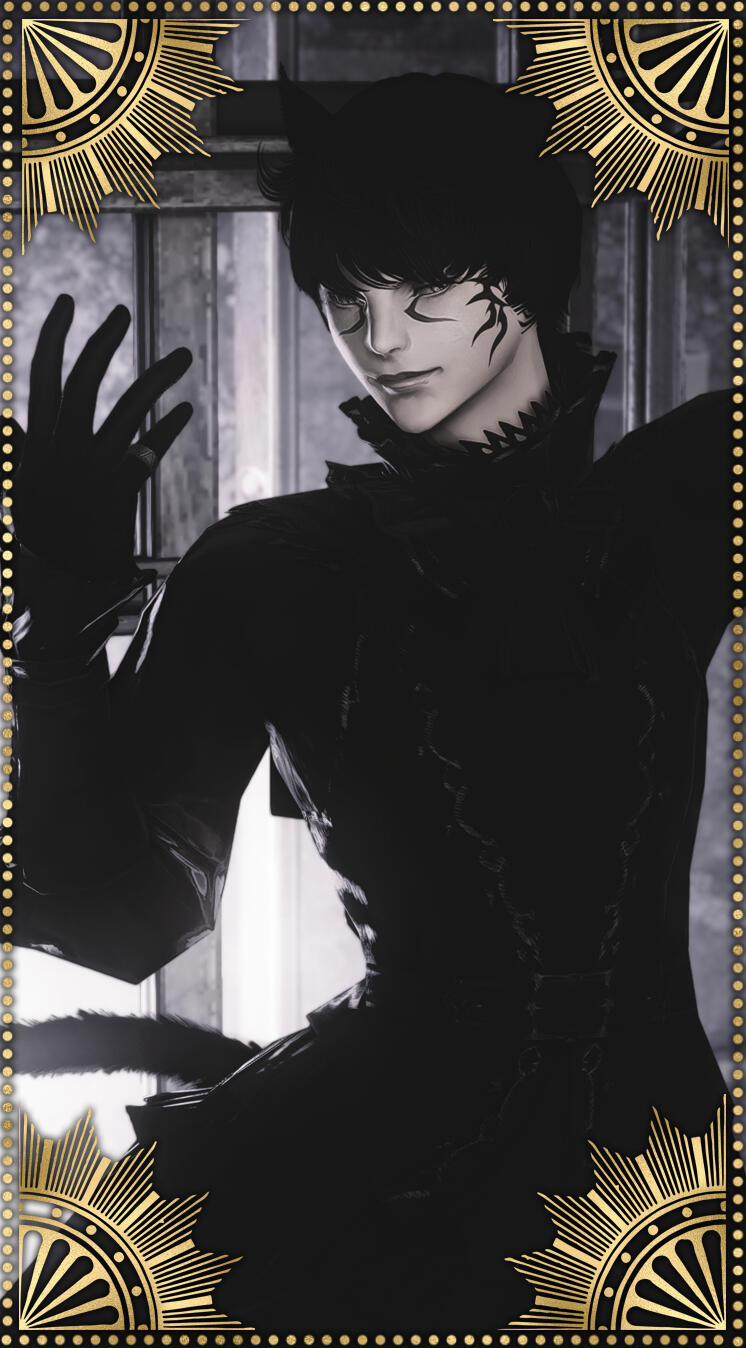

A formidable witch who was caught in the throes of his gambling addiction, manipulated into a game that resulted in him being bound to a coven against his will. Since then, he's been working at the behest of his high priestess, attempting to rebel and carve out moments of indulgence for himself in between running errands on her behalf. His only hope is he might one day be released from her clutches—even if it should result in the death of those closest to him.
Which doesn't matter, of course.
Without a heart, it's difficult to care.

About ❖ Story ❖ Hooks ❖ Relationships ❖ Gallery ❖ OOC

⸻ Content Warnings ⸻
Physical abuse; magical curses limiting autonomy;
mentions of spiders; heat/rut & a/b/o themes.
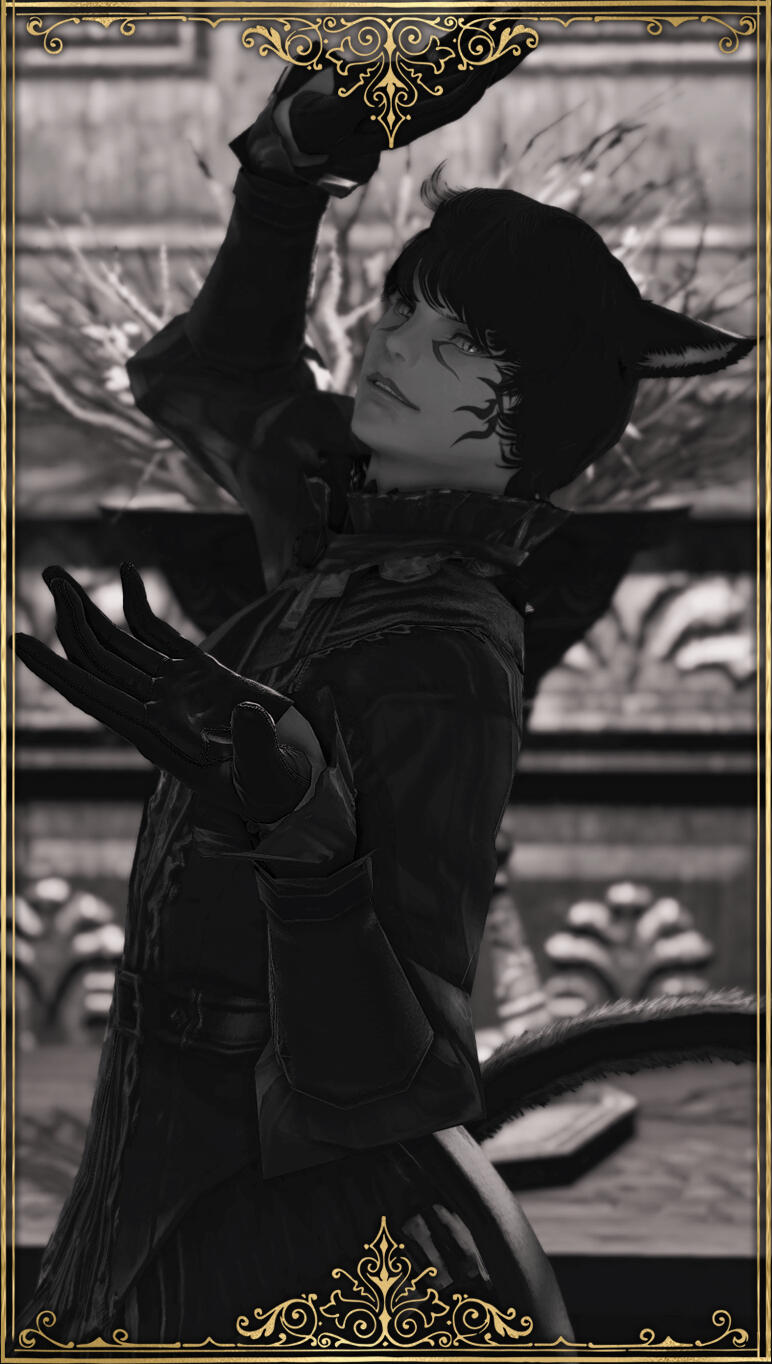
♦ Name.
⸻ E'lithas Tamsin
♦ Given Name.
⸻ E'lithas Delancre
♦ Age.
⸻ 30 summers
♦ Nameday.
⸻ 32nd Sun of the 6th Astral Moon
♦ Race.
⸻ Miqo'te ♦ Seeker of the Sun
♦ Gender.
⸻ Male (He/Him)
♦ Build.
⸻ 5'8", 140 lbs. (Tall. Willowy. Lithe.)
♦ Scent.
⸻ Crisp morning air after snowfall with a touch of sweetness.
♦ Birthplace.
⸻ Moraby Drydocks ♦ Lower La Noscea
♦ Residence.
⸻ Three Serpents' Cottage ♦ The Lavender Beds
♦ Occupation.
⸻ Sales Executive for Saltblite Holdings.
♦ Disposition.
⸻ ISTP-T ♦ Chaotic Neutral
♦ Orientation.
⸻ Pansexual (Male preference.)

E'lithas is canonically a witch, based on a homebrewed class.
To learn more, visit the link below.


♦ He does not possess a heart, both metaphorically and physically. Something is keeping his blood flowing through his body, and he does have a pulse—one that is eerily consistent and never wavers. As a result of no longer having a heart, he is unable to experience the emotion of love. If one were to listen for a heartbeat, they would hear nothing, just the pulse of blood echoing through what seems to be a hollow chamber.

♦ Half of his magick is currently being siphoned to the high priestess of his coven, causing him to be particularly weak when it comes to combat, as casting powerful offensive spells leaves him drained and defenseless.

♦ His aether seems dampened in some way, and there is a hint of an unidentifiable dark energy muddling it. It is as if he is surrounded by webbing.

♦ E'lithas's arms, legs, and back are often covered in a series of fresh bruises, typically visible only should he happen to roll up his sleeves. Should one catch a glimpse and point them out, he's apt to dismiss the concern and move to hide the blemishes in question.

♦ Recently, he has experienced the precursor to his first heat with little idea of what is happening to his body. It's incredibly frustrating, needless to say.
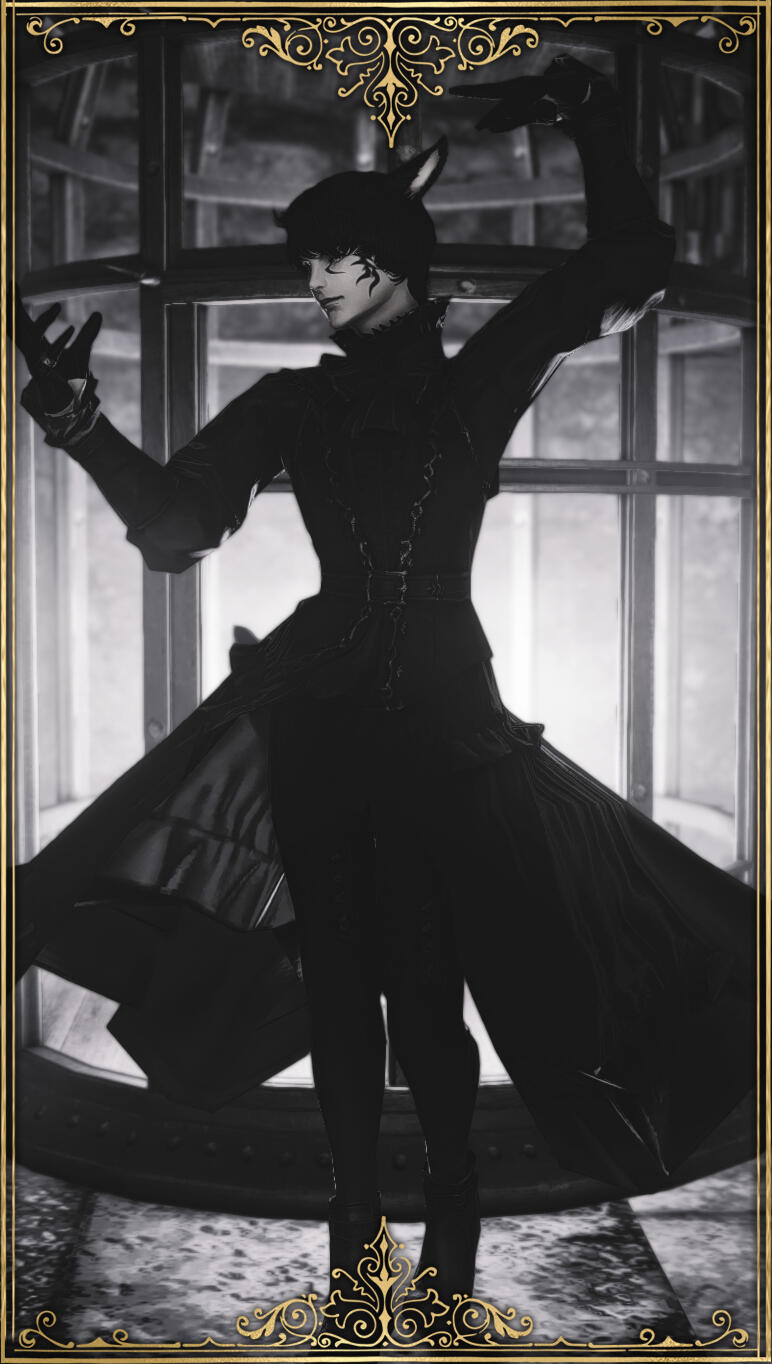

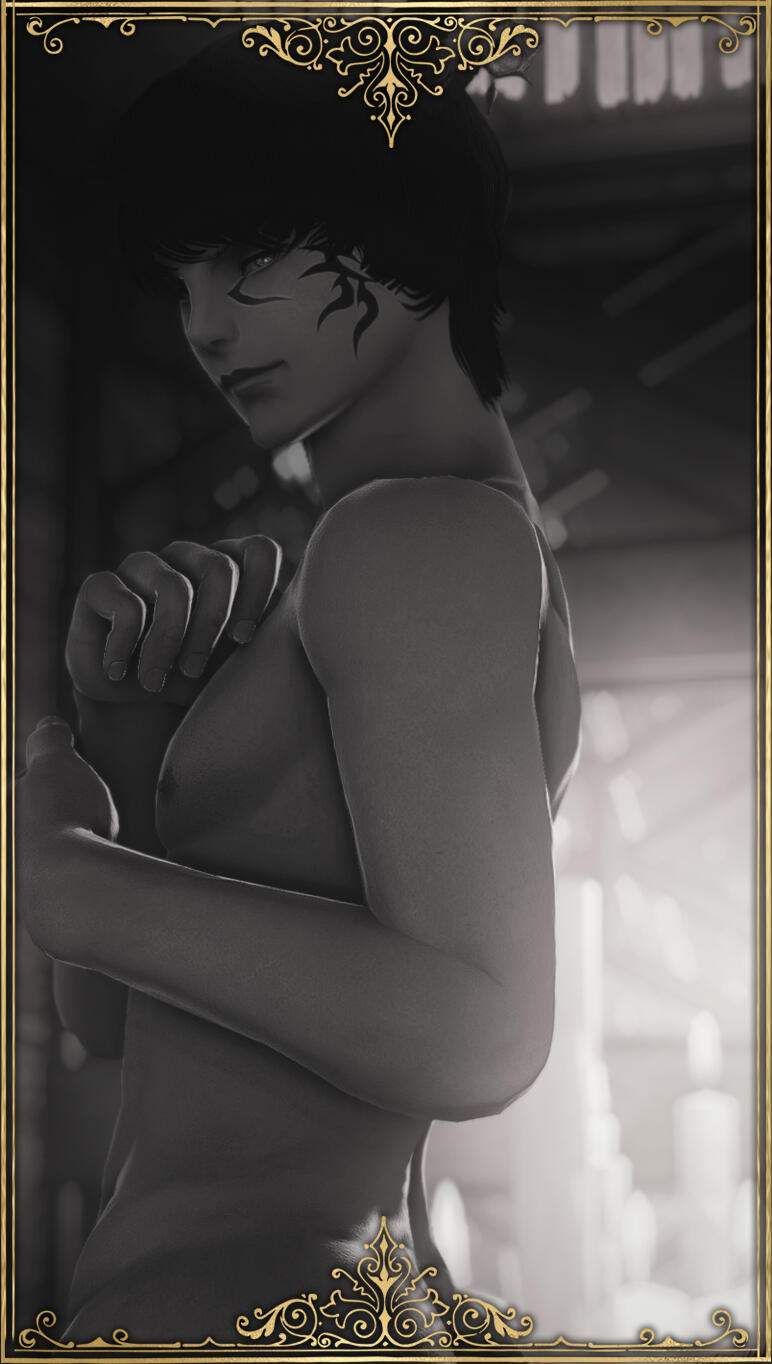

Although particularly tall for a Miqo'te, the stature afforded E'lithas by his height is somewhat negated by his lithe, willowy frame and slim waist. He is quite slender, a trait that tends to emphasize his more generous assets. His hair is a deep shade of ink black and has the slightest bit of wave to it; he prefers to keep it short for the sake of it not interfering with his spellcrafting work. His skin is considerably pale, drawing attention to the bright, acidic yellow shade of his slitted eyes. The fur of his ears and tail is very sleek, tending towards the shorter, silkier side of the spectrum and often laying rather flat (unless he's unsettled, of course, in which case his tail might puff up to twice its usual size).

♦ Notable Features.
⸻ There is a dark brand on the left side of his face, standing out starkly against his skin. It appears to be something he tries to ignore due to what it symbolizes.⸻ He dresses modestly, preferring clothing with high necks and long sleeves; dark fabrics and lace are an additional boon. He greatly detests wearing color, barring an exception only for golden or silver accents.⸻ His rear is particularly eye-catching, given how round and supple it seems to be. He dislikes the attention he attracts because of it, being one of the reasons he tends to wear garments that provide more cover.⸻ He bruises quite easily. In a similar fashion, any sort of blush stains his pale features in a rather brilliant manner.


A reclusive and independent individual by nature, E'lithas is surprisingly capable of mingling with proper and plentiful company. His sharp tongue is often curtained behind a polite and charming façade... although it tends to slip at the most minor of grievances against him. His ill-spoken, sarcastic remarks have gotten him into trouble so often that keeping record of such occurrences would be both foolish and a waste of one's time (and parchment, undoubtedly).E'lithas's greatest weakness (and one that is most often used against him) is his addictive personality. Most notably, he suffers from a severe gambling addiction, but it is rather easy for him to form obsessive behavior around other vices, whether those be substances, activities, or individuals. As it stands, his latest personal fixation is the antagonistic companionship he shares with a certain antique broker.For the most part, however, E'lithas has an incredibly short attention span and limited patience when it comes to dealing with others. If an individual bores him or proves themselves aggravating in any way, he is quick to make it known.Should one be able to earn E'lithas's attention and prove themselves trustworthy, they will find themselves to have gained a fiercely loyal ally—though his allegiance may often act as a double-edged sword, for he will stop at nothing to protect those he cares for with little regard for whomever may be caught in the crossfire.

♦ Habits.
⸻ He keeps a worn deck of playing cards on his person at most times. When egregiously bored or attempting to relax, he'll retrieve it and begin to play games against himself, either testing or practicing strategies.⸻ A true night owl, E'lithas tends to sleep in well past noon, given the option. If he's to be woken up before then, there had best be coffee readily available, otherwise he will be considerably unpleasant for some time.

♦ Vices.
⸻ A victim of an addictive personality, E'lithas's most crippling vice is gambling, no matter the form it takes. The greater the risk, the greater the pleasure he derives, often seeking to raise the stakes whenever the opportunity to do so presents itself.⸻ If it should be offered, E'lithas will find it hard to turn down absinthe, given that it's his drink of choice.
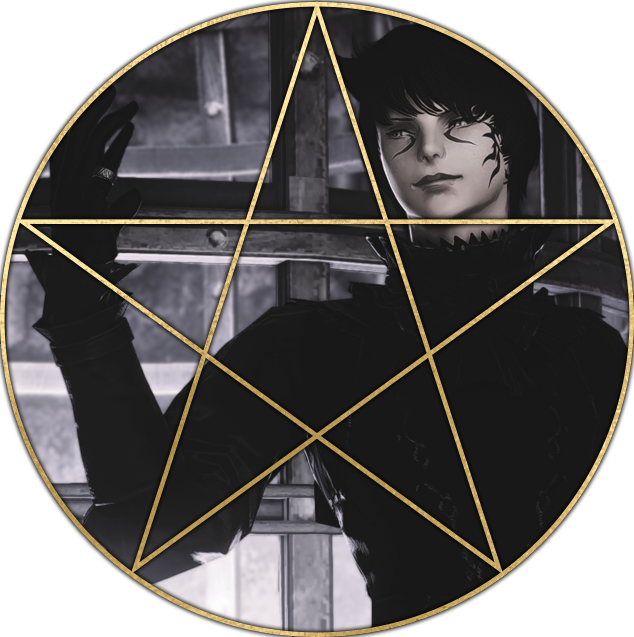
♦ Strengths.
⸻ Cunning, intuitive, charismatic, intelligent, loyal.
♦ Flaws.
⸻ Abrasive, deceitful, manipulative, selfish, distrusting.

♦ Likes.
⸻ While E'lithas enjoys all forms of gambling and card games, he has a penchant for blackjack. He's capable of counting cards, but more often than not, he'll resist the temptation to do so; risks aren't nearly as interesting if he's rigging a game in his favor, after all.⸻ One of E'lithas's favorite aspects of witchcraft is the potential of new discoveries; it is a practice that fosters invention and creativity. He personally enjoys experimenting with potion-making due to its more mathematical nature, but as of late, he's also found himself drawn to experimenting with applications of transmogrification magicks.

♦ Dislikes.
⸻ An introvert by both nature and nurture, E'lithas greatly detests prolonged social interaction and pleasantries. Fortunately, he's capable of politely suffering through such situations as a result of the extensive etiquette training he underwent as a child.⸻ Although E'lithas himself has no qualms with it, his pale complexion takes a certain disliking to intense sunshine, typically resulting in a severe sunburn or, should he push himself too much in such a situation, heatstroke.⸻ Despite having grown up in the coastal region of La Noscea, E'lithas is incapable of swimming. If thrown into a body of water, it's more likely than not he'll drown unless somehow rescued.


♦ The Disappointment ♦

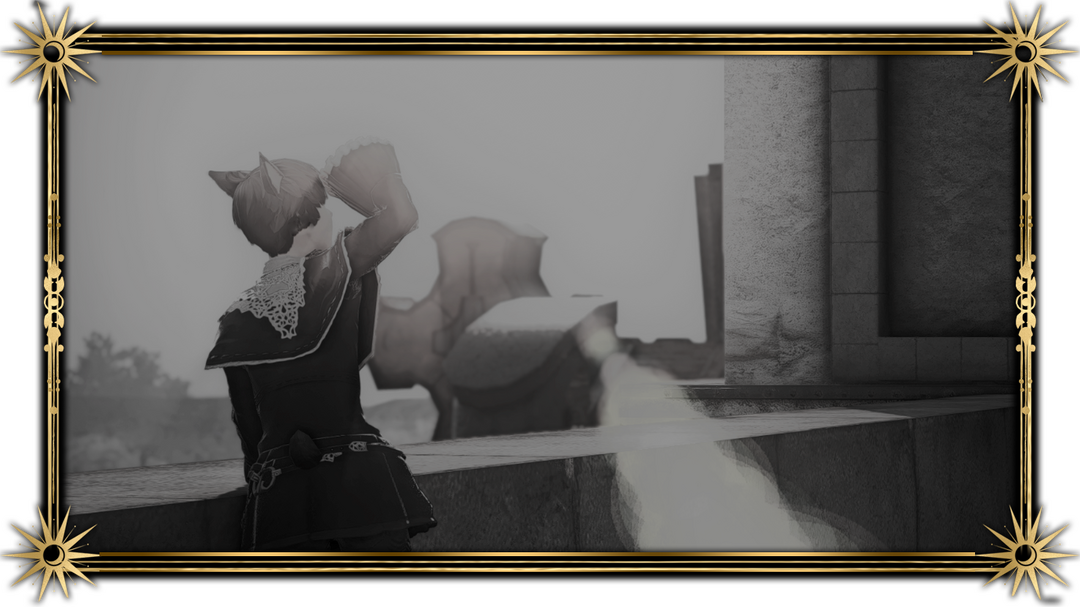
⸻ moraby drydocks ⸻
ㅤchildhoodㅤ 1551 - 1563
E’lithas was born an only child to a mother and father who chose to have exactly one heir to “keep up the appearances” of being happily bonded. They treated E’lithas more like a business asset than anything else and raised him to be cultured, investing in private schooling, piano lessons, etiquette tutors, and advanced arithmetic courses after realizing his inclination towards mathematics, something they hoped would benefit their business ventures once he was of age to begin contributing to his father’s company.Their son, of course, proved to offer none of those things.While growing up, E'lithas was subjected to neglect and mistreatment by those around him. To escape, he found himself drawn to a different application of his mathematical prowess: card games. Playing such games against himself alone in his room became a his way of escaping an otherwise lonely childhood.
After an unpleasant encounter with one of his father's business associates, a young E'lithas awakened abruptly at three bells past the twelfth that same night. Sitting up in bed, he looked out his window and caught movement at the edge of the estate property, close to the treeline. Curious, he ventured outside (none were awake to notice, nor would they have cared if they were) and crossed the well-kept lawn. Upon reaching the edge of the property, he entered the cedarwoods and was offered freedom.A deal was struck, a book signed, and a price promised to be collected at a later time — when it 'twould be delicious.Until then, E'lithas continued his tutoring, far more focused on putting his knowledge of card games to use. Now old enough to navigate the roads to Limsa Lominsa on his own, he made it a habit of regularly traveling into the main city-state, where he began to indulge in what would become one of his greatest vices: gambling. Over the next few summers, he established a reputation in the guild halls, taverns, and Limsan docks as a striking miqo’te lad with the wits about him to clean out an entire crew’s coin purses.
♦ The Devil ♦

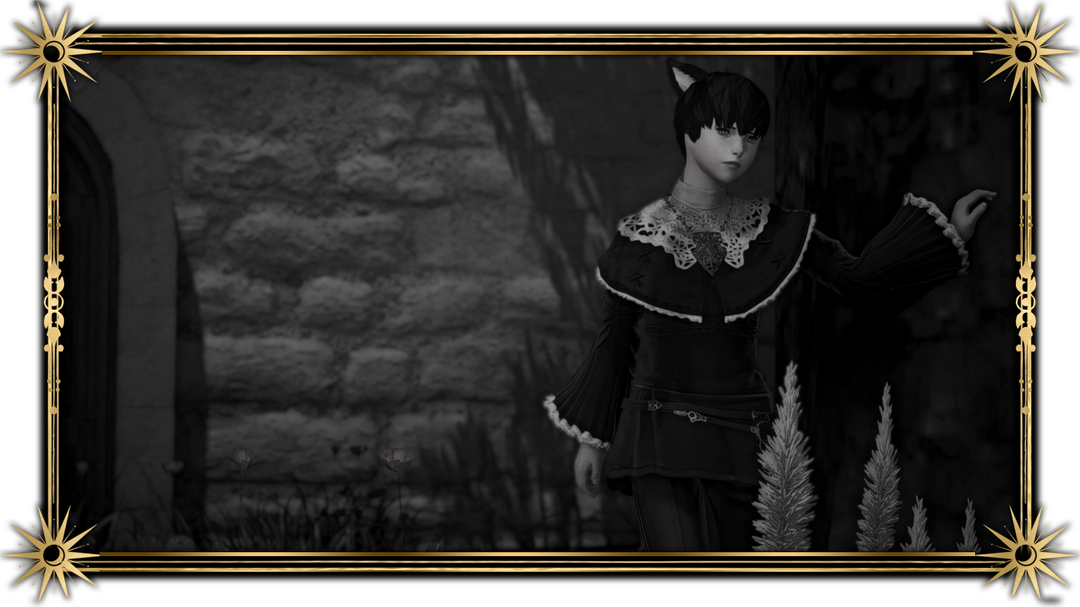
⸻ lower la noscea & limsa lominsa ⸻
ㅤ12 - 15 summersㅤ 1563 - 1566
♦ The Descent ♦

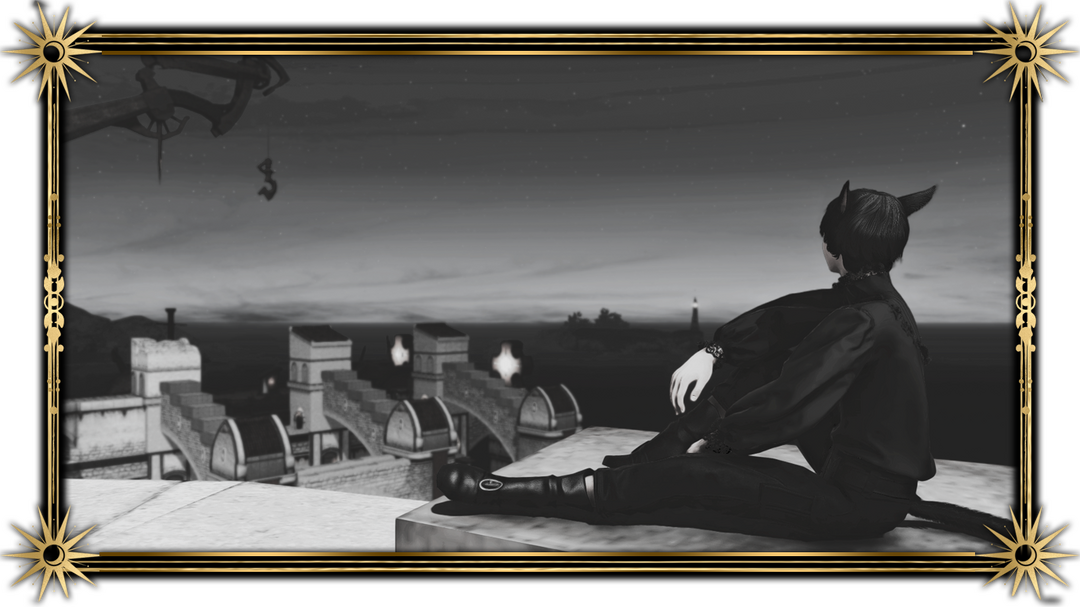
⸻ lower la noscea ⸻
ㅤ15 - 17 summersㅤ 1566 - 1568
Shortly after his fifteenth nameday, his father's business associate would make his ill intentions towards E'lithas known. Though E'lithas drove him off with teeth and nails, favor was given to the rich lord, not the petulant child. He was punished for his attempt at tarnishing such a prestigious reputation and left seething at the injustice of it all.The later date had thus arrived. As promised, the price would be collected — and with it paid, E'lithas would be made a witch.For the next two cycles, E’lithas devoted himself to his occult practices, guided by the grimoire bequeathed to him. He quickly became adept at hexes and curses, the latter of which he utilized to wrong those who had harmed him over recent summers. Vengeance felt quite satisfying, he realized.
At the age of eighteen summers, E’lithas’ parents discovered his occult practices and gave him the ultimatum to either cease them immediately or be disowned from the family. E’lithas chose the latter and left the mansion shortly thereafter, bringing with him only what he could carry by broom. From Limsa, he made is way to Ul'dah, knowing that it was home to the largest network of casinos and gambling houses in all of Aldenard.E'lithas spent the next several cycles gambling his way through the lowest of Ul'dah's seedy underground backrooms to the finest of its upper level casinos. His winnings grew at an alarming rate, and he soon earned enough gil to purchase a cottage in Gridania as a place to practice his occult magicks away from the streets of Ul’dah. It became a home of his own, and within it, he flourished.He was becoming both a powerful witch and a successful gambler, and E'lithas felt he had achieved what he sought: freedom.
♦ The Departure ♦

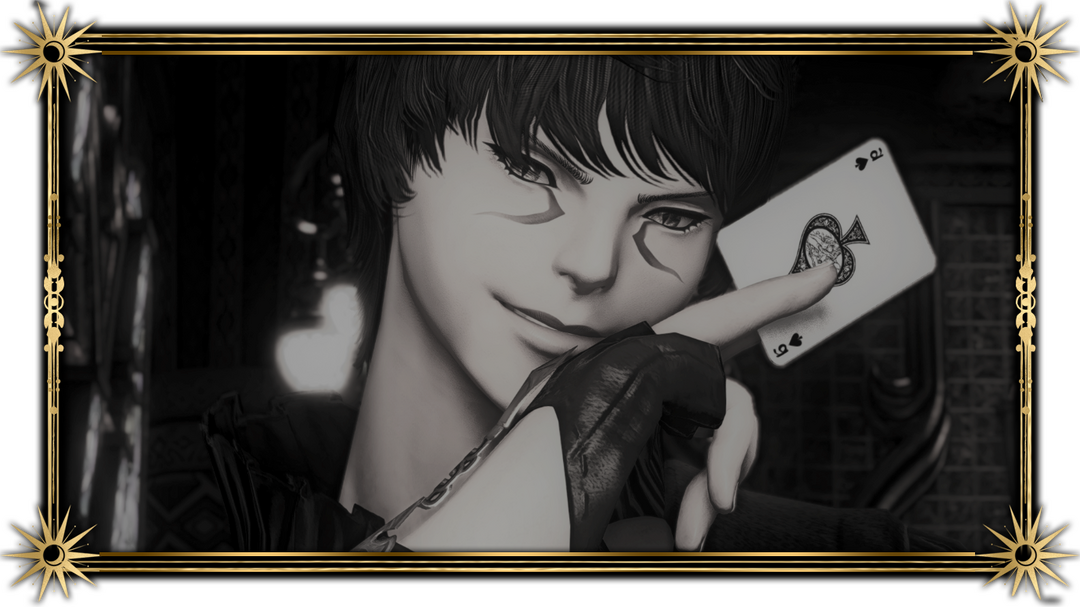
⸻ ul'dah & the lavender beds ⸻
ㅤ18 - 21 summersㅤ 1569 - 1572
♦ The Deceit ♦

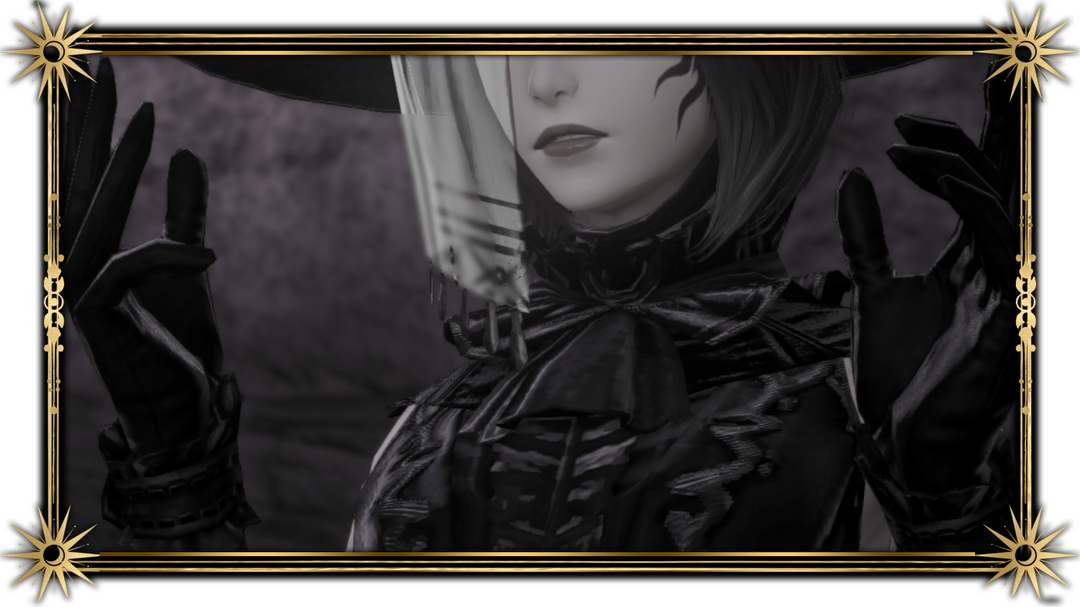
⸻ wine back sky lounge: ul'dah ⸻
ㅤ22 summersㅤ 1573
Such freedom did not last.In the year of 1573, E'lithas encountered a fellow witch in a reputable gambling lounge. She, a high priestess of her own coven, had heard of a witch growing his power within the region. She requested a game of chance, and during it, she requested that E'lithas join her coven. He dismissed the notion, won the game, and cleaned six million gil from her coin purse in one fell swoop.Alas, he had insulted her. A grave error on his part.Several moons later, the high priestess tracked E’lithas down. She offered a second game with greater stakes: if E’lithas won, he would never see her again; if she won, he would join her coven.E'lithas lost to a rigged game, but held to an oath made between witches, he was forced into her coven and bound by ritual.
E’lithas, now adapting to a life in which he was bound to the coven, began doing the high priestess' bidding. He was assigned a “caretaker” by the moniker of the Benefactor, who operated Saltblite Holdings, the cover business for his coven's dissemination of cursed artifacts and objects. In addition to being effective at placing the curses on the objects by his own hand, E’lithas had quite a way with words and manipulation; he excelled as a “sales representative,” making sure each cursed object arrived in its intended victim’s hands.The Calamity struck in 1574. E’lithas paid it little mind. It was a good time to make a profit.The Benefactor was not a kind man, but he was good at his job: he kept E’lithas in check. He was taught to hold his tongue; to do what he was asked; to perform well if he wished to be treated well.
♦ The Downfall ♦

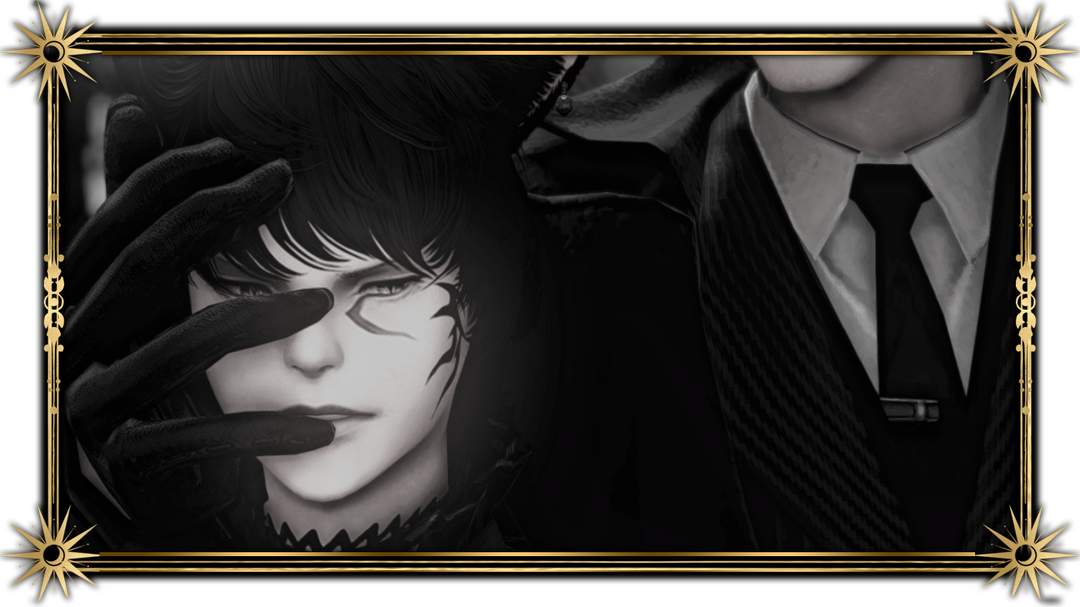
⸻ ul'dah ⸻
ㅤ22 - 29 summersㅤ 1573 - 1580
♦ The Decision ♦

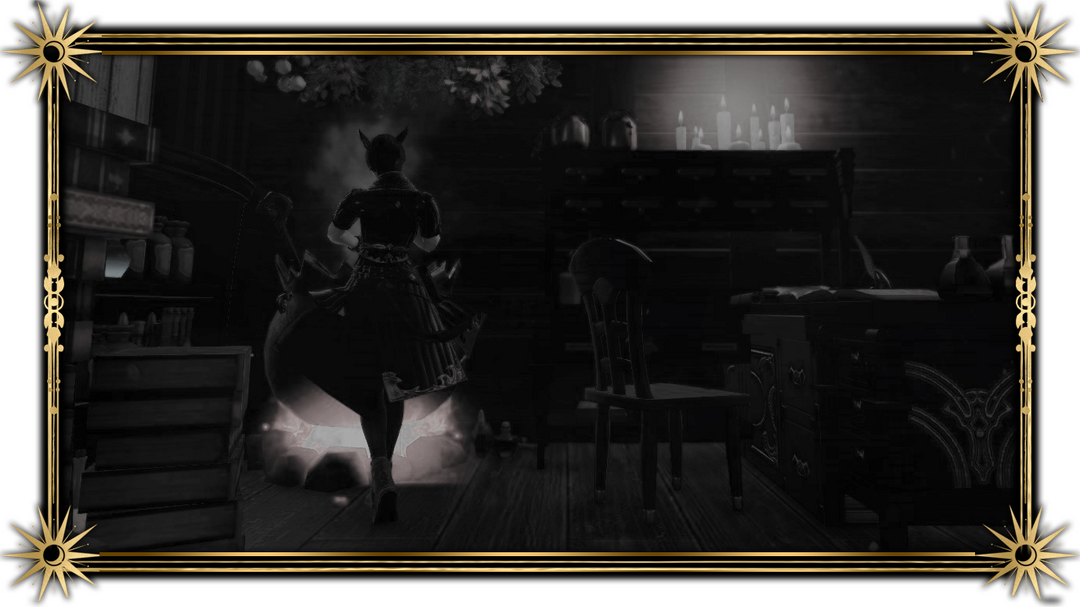
⸻ ul'dah ⸻
ㅤ29 - 30 summersㅤ 1580 - Present Day
In the present, all is not... entirely so bad.Though E'lithas is still at the beck and call of his high priestess, his own magick being siphoned off for the needs of the coven, he has managed to form a handful of small but nonetheless important allegiances. (He hesitates to call them friendships.)It is only when those bonds begin to strengthen that they pose a threat in the eyes of the high priestess, and at long last, E'lithas' most trusted companion has issued a word of unsolicited advice: "You are hardly the type who can live forever only doing what you are allowed." Is this how E'lithas wishes to live, or will he not fight for the freedom he has always wanted?E'lithas is, currently, undecided.But he believes that he may fight.
Thus does another game begin.

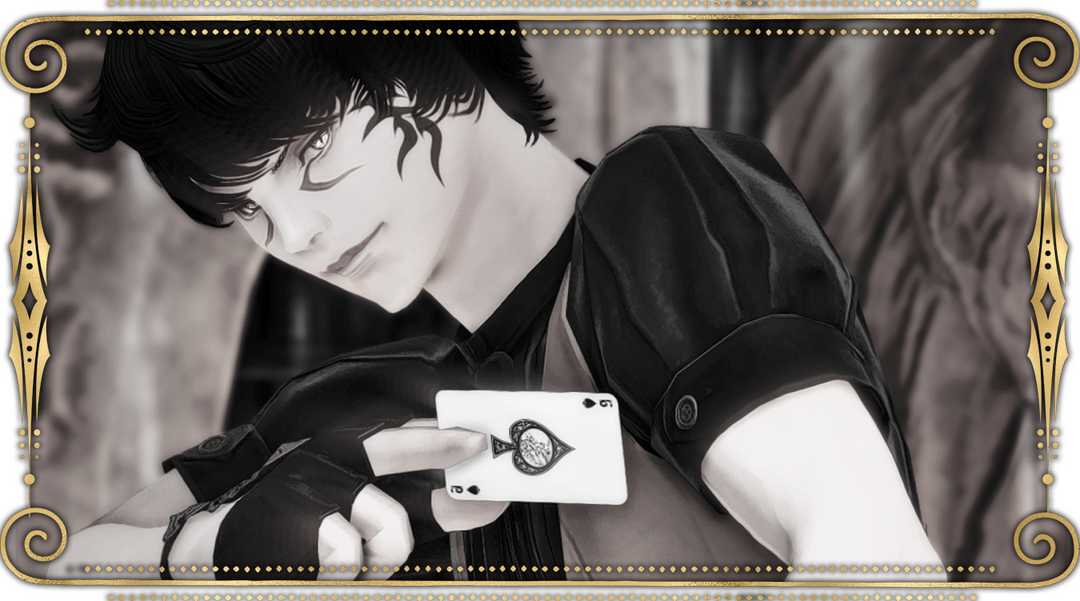
"Surely you've heard of Tamsin? The bastard's known to clean the house out wherever he rolls dice."
(Common)

If one is a frequent patron of casinos or participates in gambling rings themselves, they undoubtedly have heard his name before, as his gambling reputation precedes him—as does his rather frenetic behavior at the gambling table during the very height of a match.
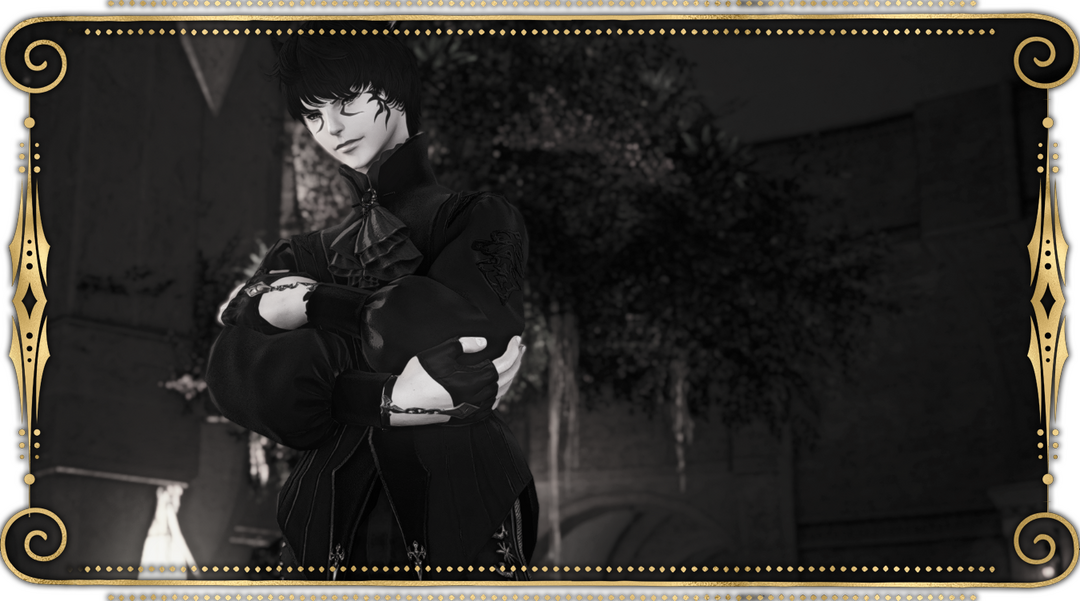
"Negotiating with Tamsin? Best of luck and keep yer' wits about ye'. He's keen of eye and sharp of tongue."
(Common)

If one has ever delved into the market of rare artifacts, they have certainly heard of Saltblite Holdings, a company that deals in the trade of magickal objects that are often sold for the highest of prices. After proving his merit for the last seven years, E'lithas has become known as one of their top sales executives.
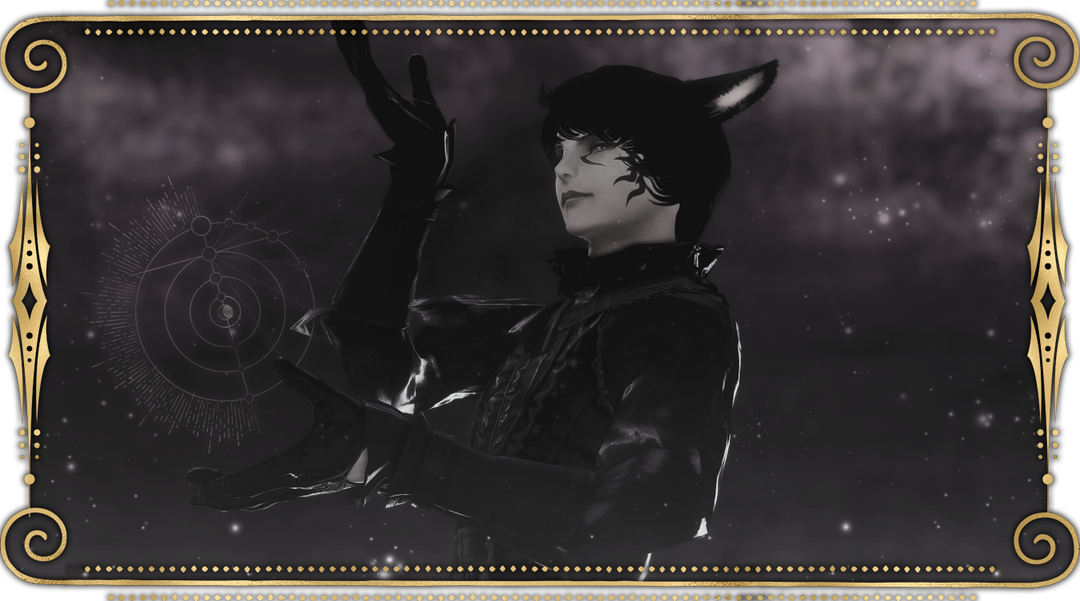
"Never quite seen casting like that. Chalk, blood, and bones? It seems nigh impractical, if ye ask me."
(Rare)

If one possesses any knowledge of the occult practice of witchcraft, one might recognize his runic casting. Furthermore, if one has connections to covens, they might recognize his as a nasty coalition, responsible for a litany of horrific incidents.
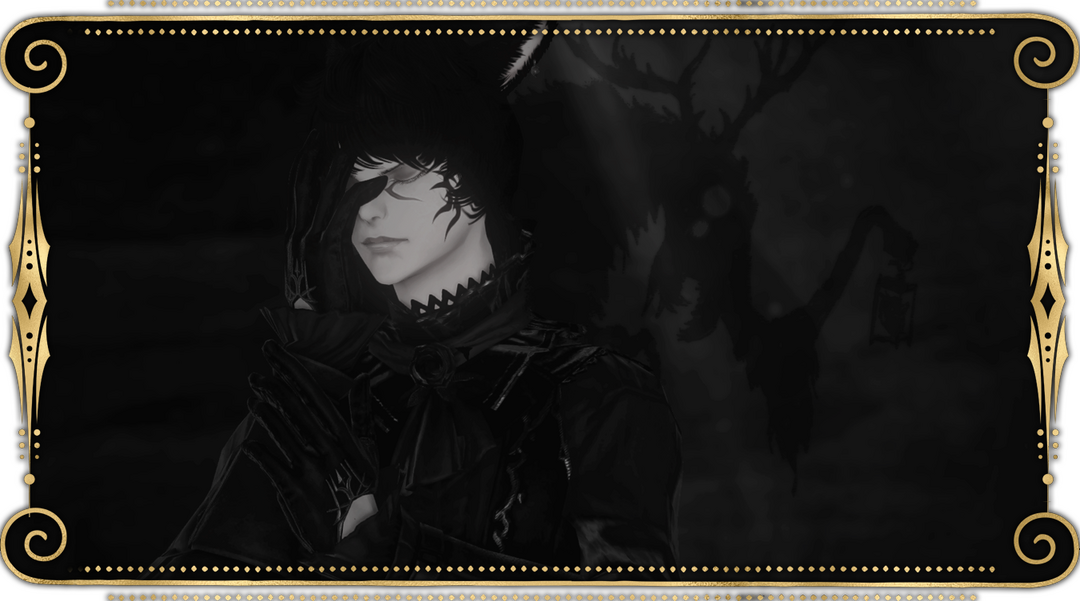
"Enjoy thy freedom, little witch. I shall come for thee when it is time for thee to fulfill thy purpose."
(Extremely Rare)

If one has a powerful affinity for the Void, they may sense something rather strange and off-putting about E'lithas, particularly in relation to his aether. It feels as if it has been touched, not by a Voidsent... but rather something far, far worse.

⸻ The Devil ⸻
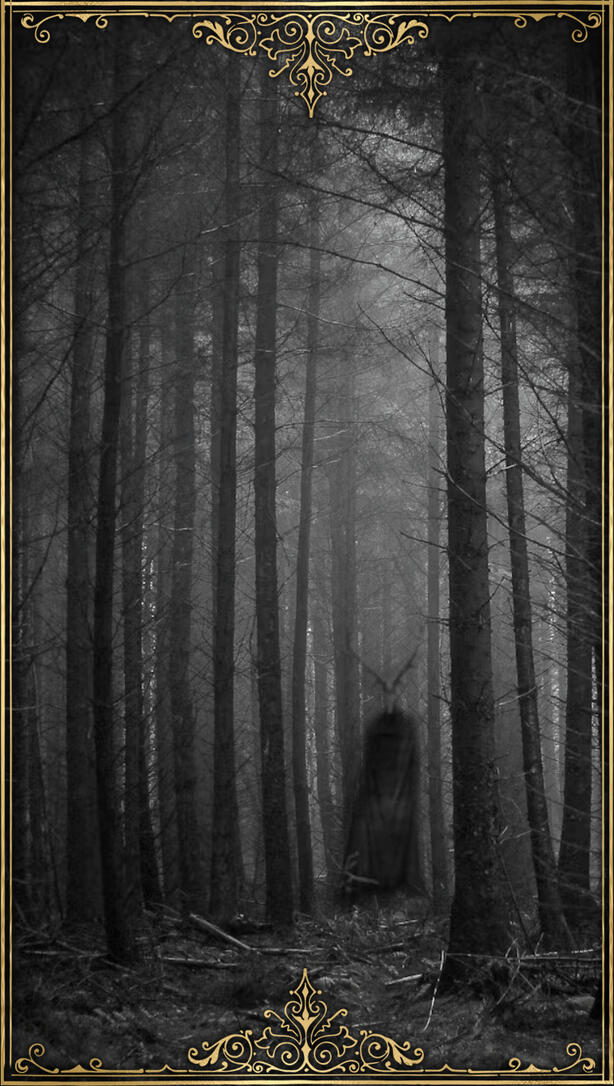
♦ The King of Sable ♦
⸻ that which stalks ⸻

It hungers.
ㅤㅤㅤㅤㅤIt waits.
⸻ The High Priestess ⸻
and Her Court
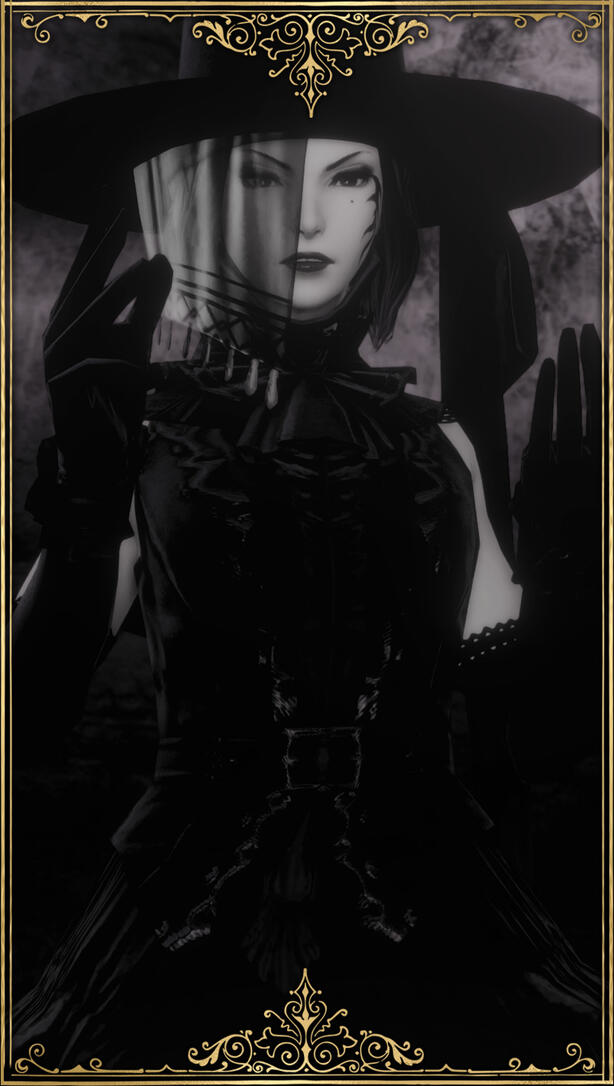
♦ Morgause ♦
⸻ she who lures ⸻

Should you find yourself wandering within her web, it is already too late. Little is known of Morgause, particularly that of her life before becoming the High Priestess of the Yafaem Coven. Even how she achieved that position is unknown, as all who were present at the time are no longer alive to share the tale. Her lust for power precedes her reputation; many witches outside the Yafaem Coven have heard her name and fear the day when they too will be sought out, leaving them with a single ultimatum: join her coven, or perish.
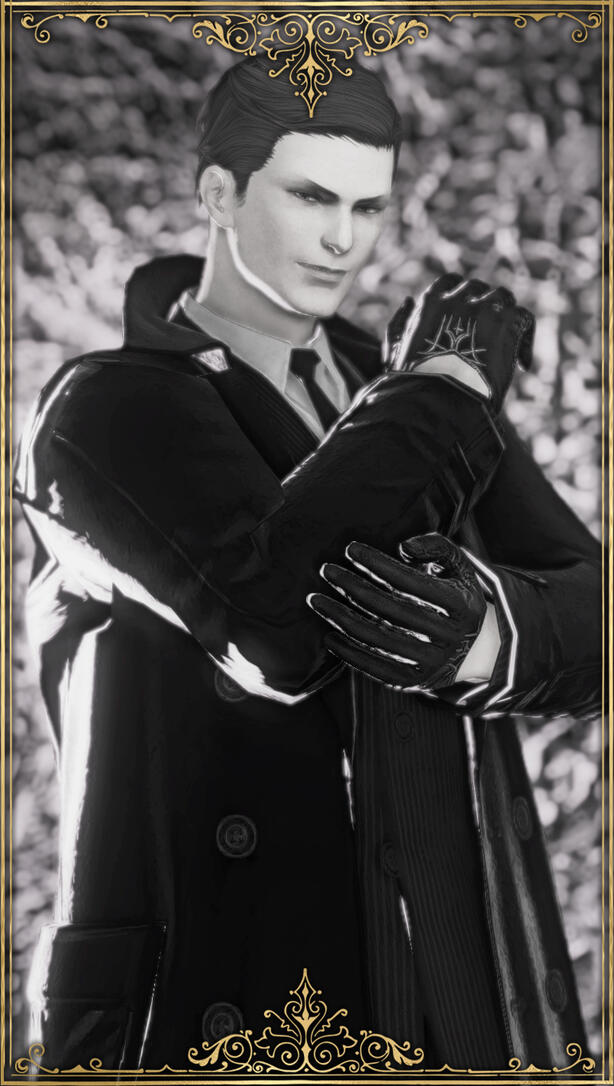
♦ The Benefactor ♦
⸻ he who controls ⸻

Unto an evil counsellor, close heart, and ear, and eye. Upon being enlisted in the Saltblite Holdings sales force, E'lithas was assigned to the Benefactor, a man intended to keep him in check by teaching him to obey and hold his tongue. They share a bed if E’lithas must reside in Ul’dah and cannot return to his cottage for the evening, which is often. Sometimes the Benefactor is gentle, sometimes he leaves E’lithas bruised and aching. It is bad, but it is not all bad, no.He makes E’lithas’ skin crawl.
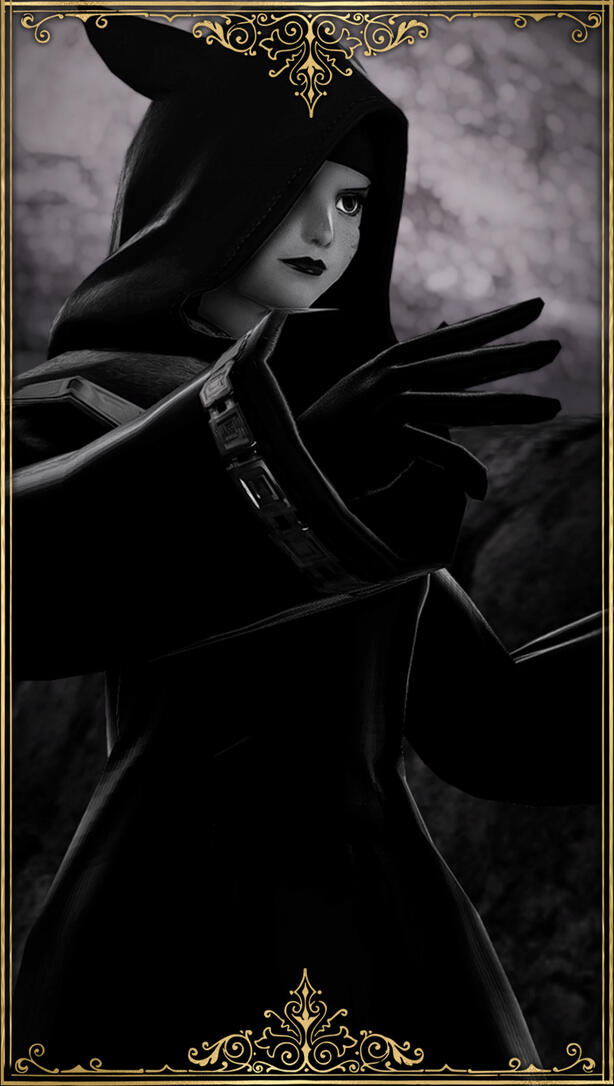
♦ Tahze ♦
⸻ she who whimpers ⸻

A fool in her own right. Despite the fact that her beloved mate was slaughtered by Morgause in retribution for crossing the high priestess' path, Tahze has thrown loyalty to the wind. Faced with the prospect of a life lived upon the streets or aligning her magickal talents with that of Morgause's coven, she chose the latter, regardless that this choice spat in the face of her lover's memory. Safety and comfort oft win over nostalgia, after all. Whereas E'lithas at first thought to be a possible ally within the coven, being one of the only fellow miqo'te within its numbers, she has since proven that she will always defer to their high priestess and will not hesitate to inform her of any murmurings.
⸻ The Hierophant ⸻
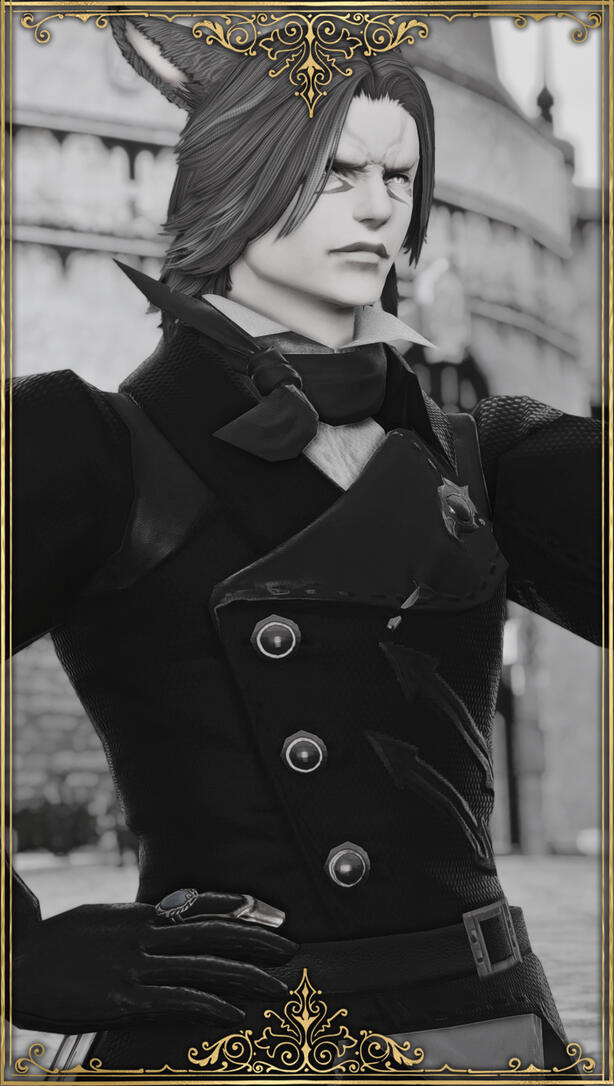
♦ E'varhil Delancre ♦
⸻ he who decries ⸻

In strictness, there is control. Just as his father had before him, E'varhil devoted his life to the Kujira Trading Company, an industrious shipping corporation whose business operated out of the ports of Kugane. When it came time for the chief officer to retire, he wanted to ensure it would be passed to someone trustworthy who had proven their loyalty. Having recognized the dedication of the Lord Delancre, the chief officer declared that E'varhil would take over for him, and thus was E'varhil married to S'Jin, the officer's daughter, to ensure his company would remain in family hands. E'varhil chose to expand the company and relocate its headquarters to his childhood home on the Isle of Vylbrand. Ever a father with a firm hand, his focus on his trade left little time and care for his son.
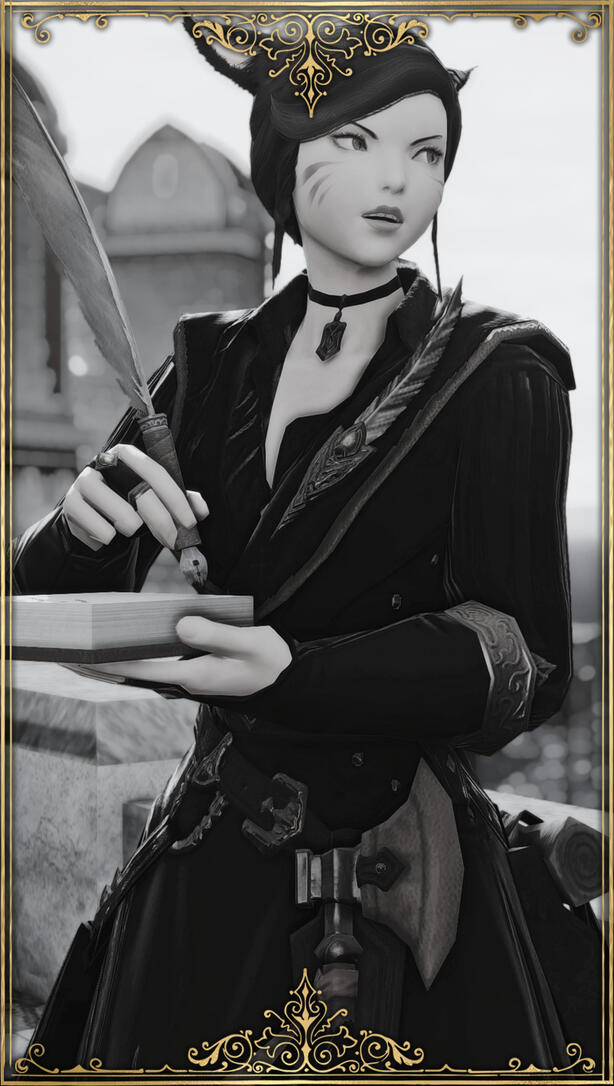
♦ S'Jin Delancre ♦
⸻ she who denies ⸻

Can such coldness be called a mask when it hides no warmth beneath it? In his eighteen summers spent growing up at home, E'lithas learned very little of his mother's life prior to bonding with E'varhil. Upon arriving in Vylbrand, she sought to distance herself from her Hingashi heritage, leaving no traces of it within her self-presentation and the estate in which the family lived. Such a fierce desire to distance herself from her past was never shared with her son. Where E'varhil was strict in his parenting, S'Jin demonstrated no motherly affection for E'lithas and was instead utterly loveless towards him, treating him as a nuisance she was obligated to care for — which was not her responsibility, as she ultimately decided, instead hiring a handmaid to care for her son.
⸻ Strength ⸻
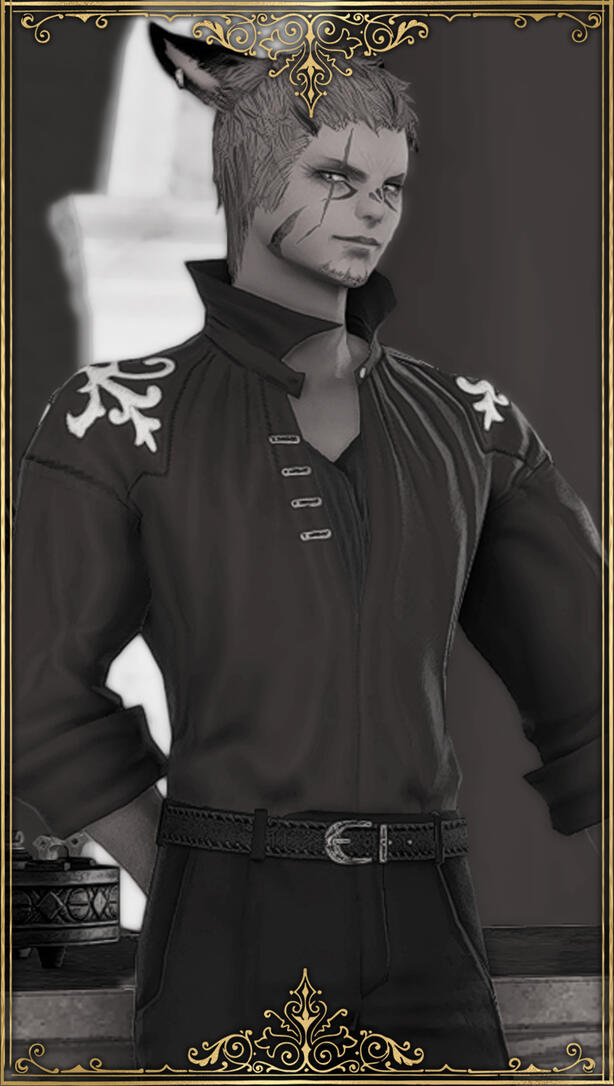
♦ V'aspar Tia ♦
⸻ he who perseveres ⸻

Only those who have fallen from great heights know what it means to claw their way back from the depths. As a former nunh who had once held a harem of his own, Asp's influence was undeniable; E'lithas found himself naturally drawn towards the other Miqo'te upon meeting — much to the elder Sunseeker's chagrin, as E'lithas's teasing and inadvertent flirtations placed him in a position of great danger when it came to igniting long since dormant instincts. While dancing around such tensions, Asp and E'lithas have continued to cross paths amidst trade markets and high society as they each continue to pursue matters of curses, artifacts, and other curiosities.
⸻ The World ⸻
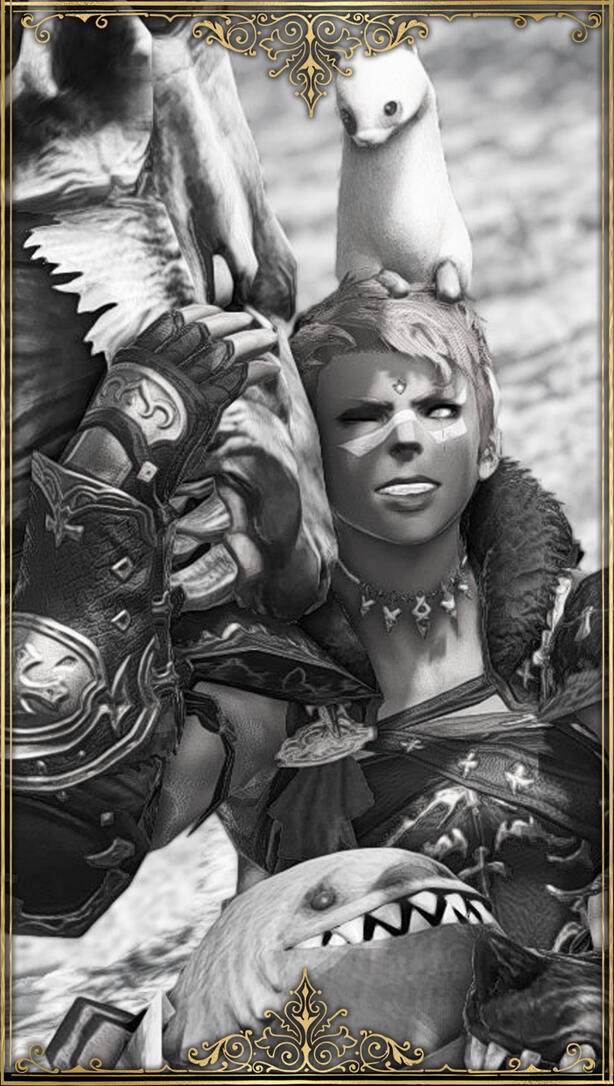
♦ Agatbryda Riverwyn ♦
⸻ she who tames ⸻

Those who have walked through fire leave sparks wherever they go. A huntress who seeks to protect her charges, no matter how often they rush headlong into danger. Her adventures and loyalty to her companions led her to inadvertently crossing paths with E'lithas and unexpectedly coming to his rescue during an auction in which he was the artifact up for purchase. The witch found himself... surprised that one would have intervened with no reason other than helping another. Since then, the two have formed a sense of camaraderie — though there is a feeling that they have more in common than first might meet the eye.
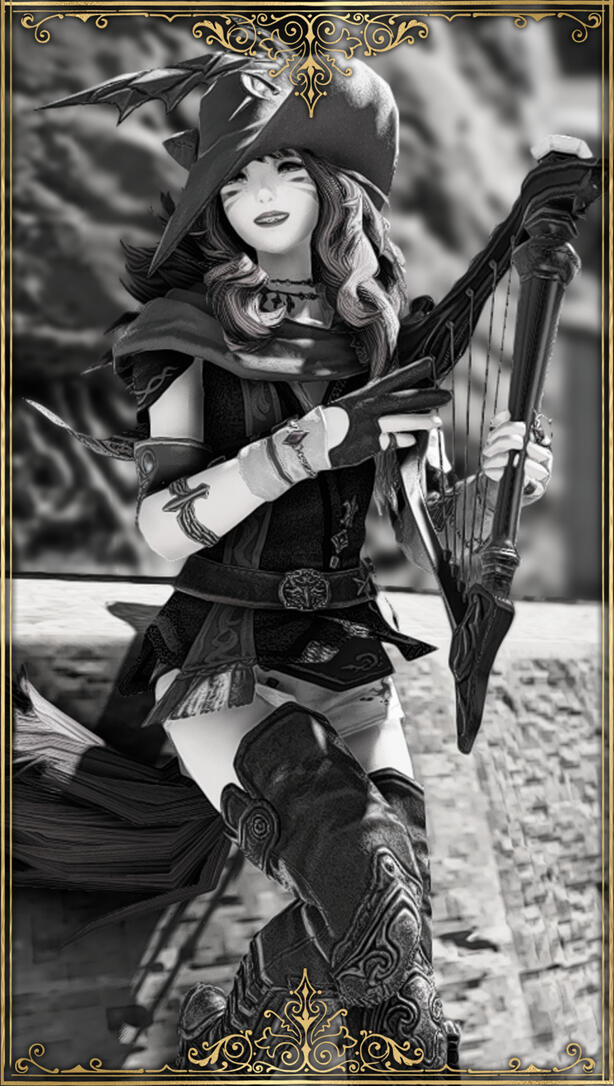
♦ Piper Galloway ♦
⸻ she who recounts ⸻

Songs carry many stories upon their notes, but do listen to the whispers in-between the melodies. A bard dedicated to her art of storytelling, Piper would seem quite the unlikely individual to earn both E'lithas's trust and friendship, and yet, it would seem she has managed to do just so. Though he has his own questions about the mysteries surrounding Piper's abilities, for now, E'lithas is simply grateful for her companionship, even if it means she's adamantly attempting to convince him to call her Piper, rather than "Miss Galloway," with little success.
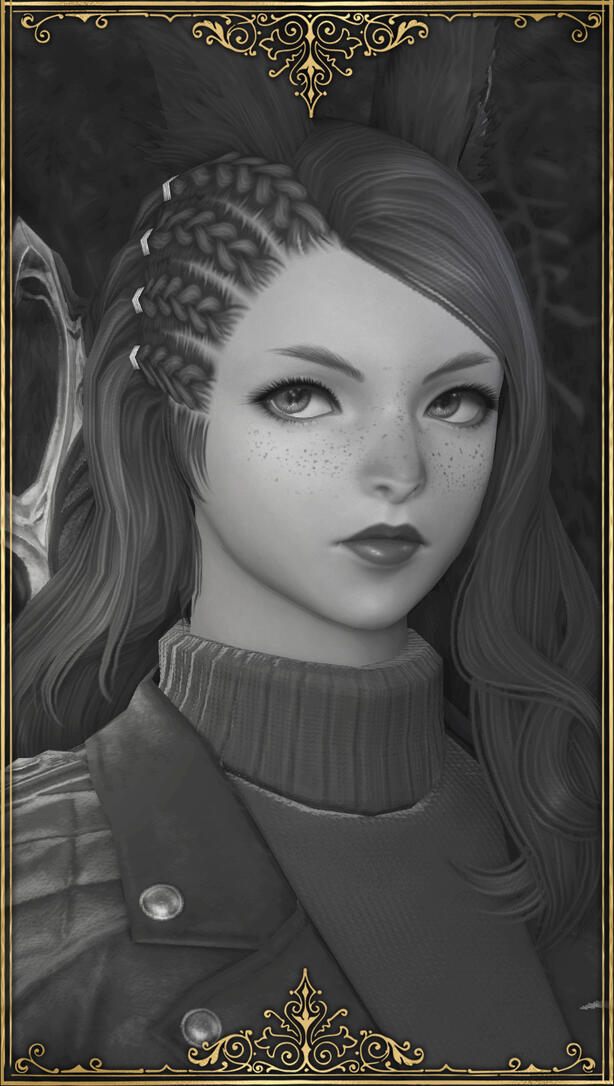
♦ Rezla Kish ♦
⸻ she who strives ⸻

To be driven to the ground and crushed, only to rise back up and blossom. A local within the Lavender Beds and mutual acquaintance between himself and Piper, E'lithas shares a simple, neighborly relationship with Rezla, first begun when the Viera peeked over his garden fence and expressed her curiosity over the rare and unusual herbs and plants growing within it. Their interactions have been relatively pleasant, despite E'lithas' cold exterior.
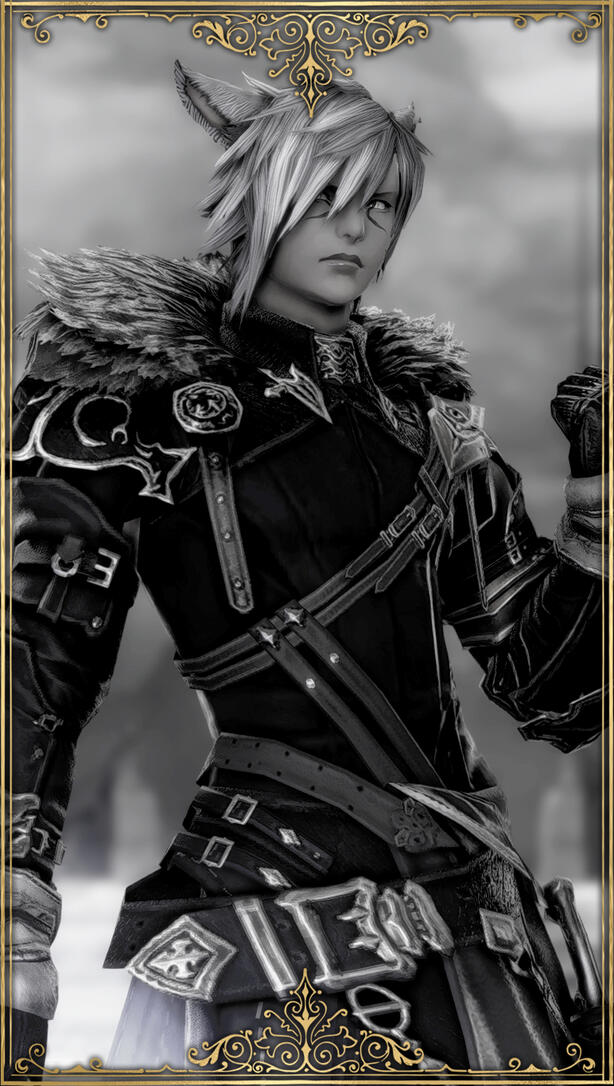
♦ Shri'ke Lanius ♦
⸻ he who protects ⸻

Thus rolls in the thunder of an oncoming storm. The name of Lanius is well known amongst the Temple Knights, being an outsider who was appointed the position of Commander of a search and rescue unit during the emergency situation of the Calamity — only to disappear alongside the rest of his unit just a little over a summer later. Returning to Ishgard three summers later, Shri'ke has managed to claw his way back up to some modicum of martial status, particularly after serving on the front lines of the Bozjan Resistance. A master of strategy and one who never hesitates to place himself in the line of danger to protect those he loves — and perhaps that is why he and E'lithas clash like oil and water. Little is known about what, exactly, occurred between the two, but the end result is a fierce distrust and loathing.
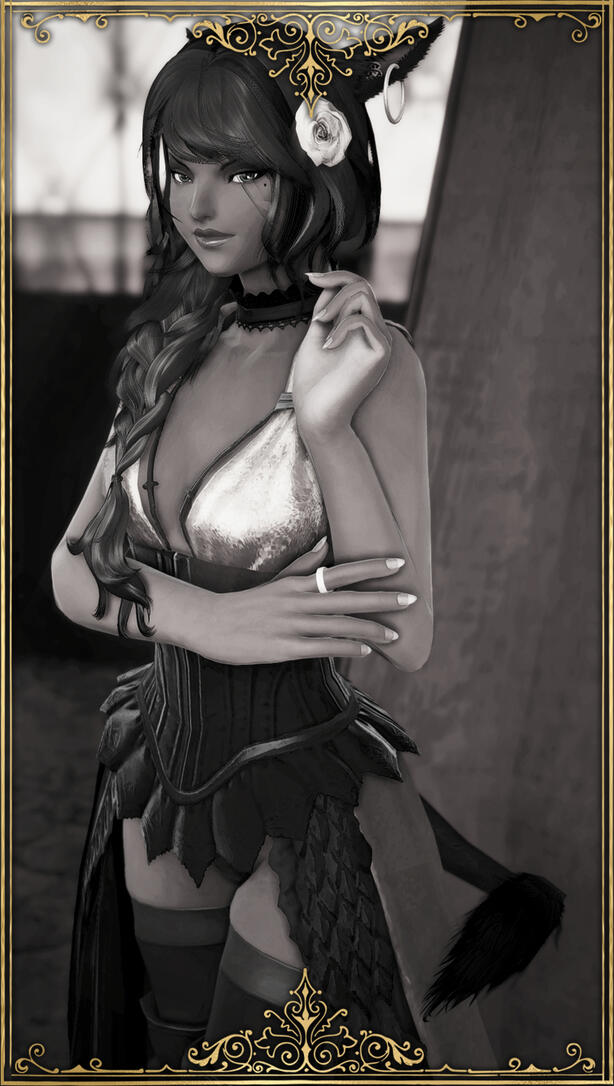
♦ Nore Vilsaia ♦
⸻ she who enchants ⸻

A songbird who doesn't know sorrow is hardly a songbird at all. A renowned singer whose vocal talents mesmerized the classiest of halls owned by Ul'dah's most elite socialites. Consistently found with a beer bottle or a cigarette in hand.

♦ About the Player ♦

Hi, I’m Chevalure (they/he)! I appreciate you visiting E'lithas' carrd. I’m a 30+ writer, curriculum designer, and streamer residing in the Midwest (USA). I'm always excited to meet new roleplay partners, so please don't hesitate to reach out!♦ In-Game Name: E'lithas Tamsin
♦ Server: Crystal • Balmung
♦ Walkup/Tells: WU ✔ (if RP tag is on) • Tells ✔
♦ Schedule ♦

I am primarily online during the following timeframes:♦ Monday - Friday: 8 PM to 1 AM EST
♦ Saturday and Sunday: 6 PM to 1 AM ESTIf you would like to set up a scene between our characters, I'd prefer to be contacted OOC first, just because I love pre-planning and chatting about plot ideas.However, if that isn't an option, feel free to approach E'lithas… at your own risk, of course.

♦ Disclaimers & Warnings ♦

♦ E'lithas has a tendency to be very prickly, defensive, and downright rude. If he acts like an absolute brat towards your character, please do not take it personally! It is in no way a reflection of how I, as the player, feel about your character or you. That being said, if he ever crosses a line with you or your character, please do not hesitate to let me know.♦ I am very strict about separation between IC and OOC. If there is any crossover of this, communication will be cut entirely. (Additionally, as a streamer, I like to keep some separation between my stream content and my private RP excursions. I ask that you respect this boundary.)♦ Please note that I’m not interested in roleplaying with anyone under the age of 21, as I enjoy exploring mature themes with my characters, particularly in terms of darker content.♦ I’m interested in both short-term and long-term scenes; however, my IRL schedule is rather busy, so short-term scenes are likely more feasible to get things started. If you’d like to discuss something long-term, please contact me OOC!♦ I am a paragraph roleplayer and tend to hit those (3/3) posts frequently, but please don't feel dissuaded from roleplaying with me if you aren't! Styles, skills, and/or language barriers can absolutely be worked around so we can have fun writing together!

⸻ I Will Roleplay... ⸻

✔ Mature & dark themes
✔ Lore-bending; not everything has to be by the book, but it should make sense.
✔ RP combat and/or rolls for fights and other determiners
✔ Graphic violence & torture
✔ Dubcon (with prior discussion)
✔ Imprisonment
✔ Magical bonds, curses, oaths, etc.
⸻ I Won't Roleplay... ⸻

✘ Noncon
✘ Metagaming/godmoding/powerplaying
✘ Permadeath
✘ Permanent disfigurement
✘ Relationships focused solely on romance

** ♦ Miscellaneous ♦**

Please note: Unless one is a witch themselves; a senior scholar of Sharlayan involved in the advanced studies of cryptic and theoretical magicks; or otherwise has access to the forbidden sections of Noumenon, it is unlikely that one would know any of the following information. Please discuss it with me OOC if you would like your character to possess this knowledge.
♦ Introduction ♦
Witches, unlike mages of other disciplines, are magick users with the power to affect change upon themselves, their environments, and those around them through means of immolating their own aether. Rather then aligning towards the acts of healing ailments or controlling the elements in a hostile manner, witches seek to manipulate the world around them and its inhabitants — some with better intentions, and some... without, needless to say.

♦ History ♦
The Fifth Astral Era of Hydaelyn's history saw society driven by the forces of magick, primarily those of the White Mages of Amdapor; the Black Mages of Mhach; and the Scholars of Nym. However, amidst the devastating conflict that emerged between the three warring city-states, so too did another form of magick: that of witchcraft, but unlike its counterparts of the era, it remained a magick shrouded in secrecy... for if it was secret, it was safe.The exact origin of witchcraft remains unknown, but it is assumed that witches have existed from this era onwards, passing on their knowledge and techniques by inducting prospective witches.
⸻ THE WAR OF THE MAGI ⸻
Upon recognizing the animosity between the mages of Amdapor, Mhach, and Nym, the most prevalent witches of the era decreed that their craft be kept private in order to protect their practice from the aggression displayed by other magick users. These witches gathered together, enacting a powerful ritual that placed a protective curse of secrecy upon all witches at the time and all of those to come that would prevent them from sharing details of their practice and their coven. The measure was taken to ensure the other mage city-states would spare little energy towards investigating the practice of witchcraft—and so did their ploy work in their favor.The three city-states of mages destroyed one another upon enacting a Calamity... but the witches remained untouched by their war, protected by their cloak of secrecy. Though their kind was scattered and displaced by the Flood of the Sixth Astral Calamity, witchcraft was preserved, contained within passed-down grimoires and whispered words.
⸻ AS THE ERAS PASS ⸻
Following the Sixth Astral Calamity, witchcraft has remained a subtle practice, one that is not openly shared nor one that eagerly invites new members into its folds. Rather, it is a practice one must discover on their own, through which ever means they manage to do so. The difficulty in doing so is that witches are still bound by the curse of their predecessors, unable to speak of their practice without risk of their own life.

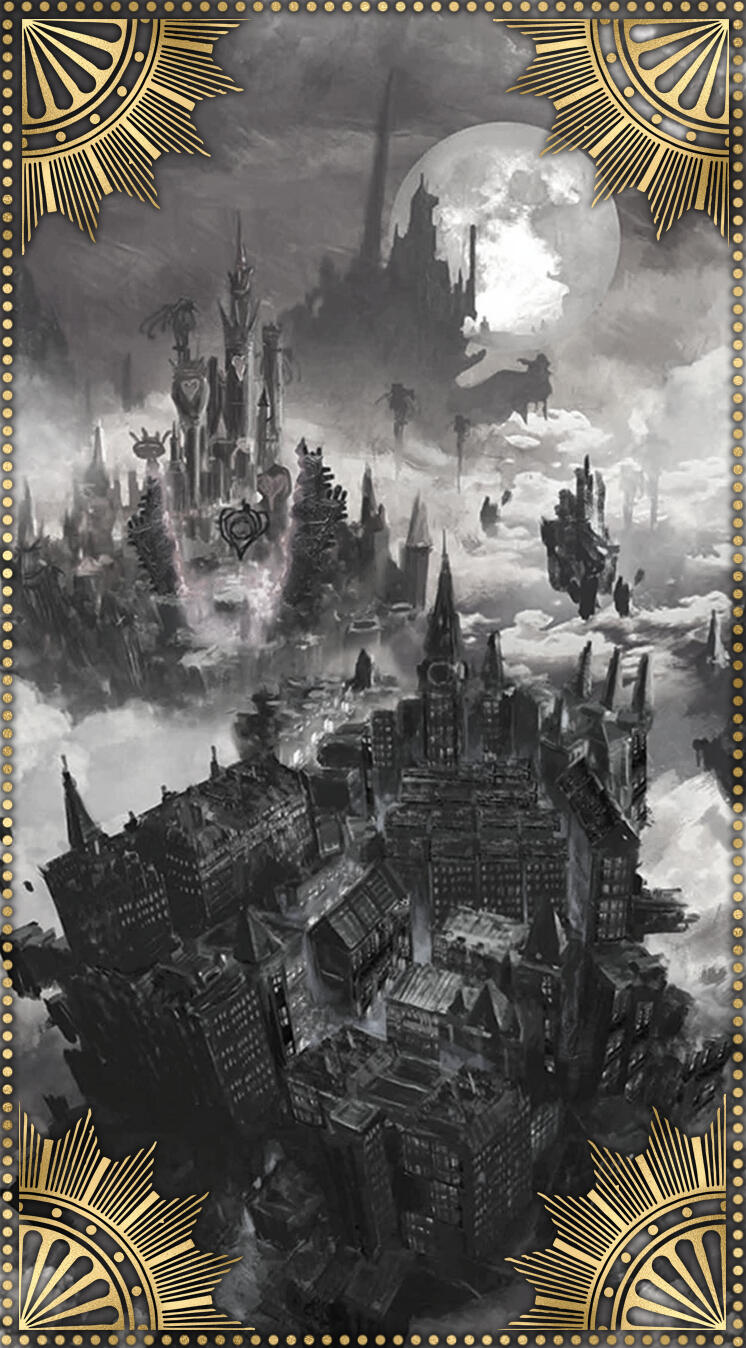


♦ Classifications ♦
Although little written documentation of witches exists, a limited branch of Sharlayan scholars have been able to categorize six types of witches: all who channel their aether in a similar method, but for different purposes and intents. It is unsure how much crossover exists between different practices of witchery, should that even be possible.
♦ CALLAID WITCH (UNCOMMON)
The magick of the callaid witch focuses on the hearth and home, using their personal domain as a sacred space for their practice. Much of their spellcraft is focused on herbalism and healing, and the nature of their craft is very individualistic, a result of their more solitary lifestyle.It is also believed that callaid witches are capable of projecting themselves between the Source and its Thirteen Reflections, using carefully cultivated herbal concoctions to bolster the astral polarity of their personal aether and cross the boundaries between Shards. This practice has yet to be confirmed, however, and is based solely on an account found buried in the pages of an archaic tome sealed within the Rhapsodies Quadrangle.
♦ EIKON WITCH (RARE)
Eikon witches worshipped the Twelve, claiming to derive their power directly from the deities of Eorzea. However, as the eras have progressed, eikon witches have been thought to nearly all but die out, the majority of their covens disbanding and what few remain existing as fringe groups on the edge of the practice. The reason for this is unknown, but it is theorized that as other forms of witchcraft ascended and overall faith in the Twelve waned, the magick of the eikon witches began to fade in turn, reducing their power and influence.
♦ INFERNAL WITCH (COMMON)
Infernal witches derive their powers from the dark energies of black magick, such as those tied to the Void. Alongside the craft of eikon witchery, infernal witchery is thought to be one of the oldest forms, likely having been derived from the magical theories of Mhach. The majority of their practice is centralized on ceremonial magick that uses specific rituals to invoke change, many of which incorporate bloodletting, necromantic energy, and sacrifices. Such rituals were supposedly created with the intention of protection and defense, particularly during the War of the Magi, but now these rituals are most often used by infernal witches with ill intentions, focusing on that which causes harm and destruction.The vast majority of infernal witches are drawn to the practice by promises of power, revenge, and protection, the lattermost benefit existing in the form of covens. Due to the aetherical demand many of these rituals require, infernal witches find more success when united within a coven, which allows them to combine their magicks to create stronger, more powerful spells that will achieve greater outcomes.
♦ CRIOSTAL WITCH (COMMON)
Criostal witches practice magick based upon the primary elements of Hydaelyn: Fire, Wind, Lightning, Water, Ice, and Earth. Their spellcraft honors each of these elements; typically, they possess an altar dedicated to each specific element that incorporates elemental crystals, shards, or clusters. These crystals also act as catalysts and amplifiers in their spellwork. Due to the abundance of crystalline material available within the world, pursuing the practice of criostal witchcraft is considerably easier than that of other classifications.
♦ LIATH WITCH (RARE)
The practice of liath witches straddles the divide between white and black magicks, choosing to utilize spellcraft that might be attuned to either energy depending upon the situation. That being said, their preferred form of spellcasting is most often that of curses and hexes, the results of which can range from minor inconveniences and bad luck to irrevocable harm done unto those they wish to suffer.Liath witches typically seek to correct the circumstances they find to be unfair, using their magick for personal gain. As such, they prefer to practice alone, rather than with a coven. It is rare for a liath witch to have acquired their knowledge from a mentor, most often than not learning the practice using self-taught methods. However, given the fact that resources on witchcraft are incredibly rare, it is unlikely that one would be able to simply learn such a practice this way. One theory, originally developed and perpetuated by Marmfohc Marmfohcsyn of Aerslant, claims a liath witch must be a reincarnation of a previous witch's soul, and upon reaching puberty, the knowledge of their magick reawakens. However, as knowledge of magick and aether has grown since the original formation of the theory prior to the Sixth Umbral Calamity, all other scholars of magick have dismissed it, given that its basis remains unquantifiable and—as many have agreed—"utterly ridiculous."
♦ ORACLE WITCH (COMMON)
Oracle witches seek to divine that which lies ahead, employing a variety of mediums in order to do so. Their spells and rituals tend to focus on interpreting that which is spoken to them through their mediums of choice, seeking to actively influence the fate of those around them—as well as their own—by using their insight of potential futures. They are commonly receivers of visions as a result of their mastery of foresight, something that can act as both a blessing and a curse.Often, oracle witches were formerly-practicing astromancers who have exchanged their Deck of Arcana for a witch's tarot deck, calling upon either white or black magicks to divine the future and seek guidance, rather than reading the heavens to foretell their fortunes. Whether an oracle witch utilizes white or black magicks depends primarily on the intentions behind their readings: should they seek to aid others, white magick is most effective; likewise, should they intend only to consult the cards for their own gain, they are more apt to find success with the power of black magicks.

♦ Powers & Abilities ♦
Depending on skill level, seniority, and years of practice, witches possess a number of powers. These abilities can, of course, be amplified by joining together, but even a lone witch is capable of performing significant feats of magick.
⸻ Spell Casting ⸻
Spellcasting is the ability to enact change and preside one's will over the course of events through the use of incantations, recitations, rituals, or manufacturing bewitched objects. A spell is, essentially, a magical formula initiated to produce a supernatural effect, thus consisting of a ritualistic action, a specific phrase of words or verses, the activation of a magical instrument, or any combination of these. A particularly advanced witch is capable of manifesting the results of a spell without resorting to incantations and rituals.
⸻ Bloodletting ⸻
As elaborated upon further in the "Tools" section, the act of bloodletting augments and amplifies the power of a witch's spell or ritual, particularly when the blood is acquired by sacrificial means.
⸻ Runes ⸻
Regardless of a witch's classification, all spells and rituals require the use of runes. These may be inscribed upon a surface, a vessel, an artifact, an accessory, or even the caster's skin, should such an act be necessary. Much like other mages may use a staff or codex, so too does a witch channel their magic through runes.
⸻ Witchtongue ⸻
Spells and incantations are recited in a language presently referred to as Witchtongue; alas, its original name was lost amidst the floodwaters of the Sixth Astral Calamity. As such, it is unclear what language from which it was originally derived, given its stark contrast in pronunciation to most Eorzean dialects.

♦ Varieties of Magicks ♦
The magick of witches may manifest in many different forms, depending on how the witch in question chooses to practice their craft. Some forms of witch magick share similarities with other magicks practiced by mages of the realm, though it is unsure if they are connected or derivative in any way.
♦ Astral Projection ⸻ A form of magick associated with crossing boundaries between realms and the very Shards themselves, sometimes referred to as "Shard Jumping." It is unclear how common (let alone successful) the practice is in current times.♦ Coiremancy ⸻ A form of magick associated with arousal and sexual intercourse in order to channel the emotional power of lust into one's magick.♦ Conjuration ⸻ A form of magick associated with summoning demons, voidsent, and other beings.♦ Cursing ⸻ A form of magick associated with placing a curse on an individual, an object, or an area, causing negative effects that range from physical harm to even death. (Hexing is a more mild version that focuses on less dangerous forms of misfortune.)♦ Dreamwalking ⸻ A form of magick associated with the dangerous practice of entering the dreams of another being, at risk of losing all discernment between reality and imagination.♦ Enchanting ⸻ A form of magick associated with the ability to imbue an object with a magical property.♦ Herbalism ⸻ A form of magick associated with the study of botany and the use of plants in the application of healing magicks.♦ Ichormancy ⸻ A form of magick associated with the generous use of blood, primarily that which is offered through sacrifice.♦ Necromancy ⸻ A form of magick associated with resurrecting the dead with the intention of controlling and manipulating them.♦ Potion Making ⸻ A form of magick associated with the concocting of potions, elixirs, and remedies that have supernatural properties when consumed.♦ Summoning ⸻ A form of magick associated with the power to summon an individual, familiar, or object from one location to another. Simple summoning spells might transport a small item across a room and may be performed by an individual, but a spell transporting a witch from one location to another requires the power of a coven.♦ Transmogrification ⸻ A form of magick associated with utilizing magick to alter the physical state of a living being, such as physically assuming the form of another creature, either wholly or partially.♦ Warding ⸻ A form of magick associated with placing protection spells and wards on people, objects, and locations to shield them from harm or danger.

♦ Familiars ♦
Familiars are living creatures to which a witch has bound themselves by weaving together their individual aether. The familiar acts as a witch's domestic companion, servant, and spy, able to perform feats that they normally would not be able to as a result of their connection to their master's magick. Most witches prefer familiars of a small, compact stature, as it allows for easier transportation and concealment.A witch is able to utilize their familiar in a variety of ways. Not only does the familiar serve as something of an attendant to the witch's practice of magick, but a familiar most commonly assists with acts of espionage. In a situation wherein the witch's presence might be questioned or thought of as suspicious, their familiar can easily serve as a conduit through which they can observe matters. This is most frequently done by channeling one's eyesight through the familiar; however, it comes with a price: while the witch's eyesight is being channeled, they are left blind and relatively defenseless in their own body.As familiars are bound to their witches, should their master die, so too will they, though it is unclear if this occurs due to the splitting of their shared aether or simply the agony of losing their closest companion.E'lithas's familiar, Blair, is an infant bat who he found abandoned within the attic of the cottage he purchased for himself in the Lavender Beds. After nursing her back to health, she pledged loyalty to him, and he bound them together as witch and familiar. She is a small, skittish thing, but also tremendously playful once she warms up to someone.

♦ Weaknesses ♦
While undeniably powerful, witchery suffers from several significant weaknesses, many of which led to it remaining a far more secretive practice during the War of the Magi and have since limited its widespread growth. The methods of casting utilized by witches are, for the most part, unviable in terms of combat; as such, witchery never gained the status of a more universally-accepted battle class in the same vein as other magick users of the realm.
⸻ Distraction ⸻
Given the nature of their casting abilities, witches need the opportunity to concentrate on their spells with their full attention—should they be unable to do so, their spells may be rendered ineffective. As spells are spoken verbally and require a certain amount of time to take effect based on their complexity, the witch casting such a spell is left vulnerable until it is completed.
⸻ Containment Sigils ⸻
There exist certain sigils which can be utilized to contain a witch by neutralizing their magick, thus binding them in place. Knowledge of these sigils is few and far between, however; the most common is an Somtu Binding Sigil, but even that requires the collective power of a coven to maintain. Less common and more powerful sigils (ones possible to maintain as an individual) are carefully guarded and remain known only to a select few witches.
⸻ Physical Restriction ⸻
As witches require the ability to trace runes and speak a verbal incantation to utilize their magick, they may be prevented from doing so by restricting their hands through the use of restraints, as well as by gagging or otherwise silencing them. If one truly wishes to guarantee that a witch should be unable to cast any of their spells, the dismemberment of their hands or the removal of their tongue is recommended.
⸻ Preparation ⸻
The majority of complex spellwork requires ingredients, tools, and other components specific to the nature of that particular spell, as well as knowledge of the necessary incantation to invoke it. If a witch wishes to cast such a spell, they must carefully prepare beforehand. It is an anticipatory form of magick, requiring witches to "play the long game," always attempting to remain a step—or several—ahead of potential obstacles and enemies.

♦ Tools & Supplies ♦
The practice of witchery requires the use of certain tools, each of which exists for a different purpose. Therefore, not every witch will utilize every tool, instead customizing their instruments to their personal craft.While the most powerful of witches do not require the use of physical objects to focus their intent, most witches find greater success in doing so. Paraphernalia used in witchcraft is not limited to this list, but the following are considered to be the most common and essential items for the practice.
♦ ATHAME (DAGGER)
A ceremonial blade, most commonly with a handle carved from black willow lumber. It is often used as a ritual implement to channel and direct one's magick, particularly that which is associated with fire-aspected aether. The athame is not used to harm or draw blood during rituals. (E'lithas's Athame)
♦ BESOM (BROOM)
A witch's broom is unique to the witch, as it is manifested from their personal aether, each taking on an appearance reflective of its originator. Having taken on the magical properties of the witch who conjured it, the besom is capable of making decisions independently of its user.The brush of the besom is rounded, having been constructed around a cylindrical handle; it is typically made of straw, sorghum, or twigs, but some witches with a penchant for artistry have been known to manifest brooms with sable brushes. The handle is most often carved from ebony, hallowed chestnut, rosewood, birch, black willow, or sandalwood lumbers.
♦ CANDLES
A cylindrical block of wax with an embedded wick, a candle (or several) is commonly lit during a spell or ritual in order to amplify the witch's magic. Some spells and rituals may require candles to be of a certain color or contain elements of hair, blood, herbs, or animal parts within the wax itself.
♦ CAULDRON
A large metal pot, commonly used to serve as a vessel for brewing potions, elixirs, and incenses. While traditional large-bellied iron pots are the most preferable, any pot may be used for this purpose and may be considered a cauldron.
♦ CHALICE
A cup or goblet used during rituals for collecting sacrificial water, wine, and other liquids, such as blood.
♦ CHALK
A common material used for etching runes, especially those on a smaller scale. Runes for rituals and spells of a larger scale may be carved or painted, but for quick, simple casts, chalk is preferable and often kept on hand for such a situation—although witches are often prepared to use whatever substances they have at their disposal for this purpose. It should be noted that a rune traced with blood will naturally be more powerful, but not all witches are apt to bleed themselves for every cast they must make.
♦ GRIMOIRE (BOOK OF SHADOWS)
A grimoire—interchangeably referred to as a Book of Shadows—is a witch's private handwritten journal. It is used by the witch to document spellcraft, incantations, potion recipes, rituals, and their personal experimentation with their craft. Some witches choose to record personal goals, opinions, and thoughts within its pages as well, simultaneously using it as a diary of sorts.A grimoire is often made by a mentor and gifted to their prodigy, but the most effective grimoire is made by the witch intending to use it. Leather or a tempered cloth is used for the cover while the pages are comprised of handmade parchment. As with a besom, a grimoire will vary in shape, size, and style depending upon the witch.The book must be bound to the witch by the act of signing the first page with their own blood, thus linking their magick to the grimoire's power. If properly enchanted, no one but the witch who inscribes the grimoire will be able to read its contents—so long as the owner yet lives. When the witch dies, their grimoire too must be destroyed, lest their aetherical ties to the living realm remain.
♦ MIRROR
A witch's mirror is usually made of a black glass tile, which provides a passable reflection that allows for scrying. More advanced witches may utilize such instruments for directing light-based energy, protective and binding spellcraft, or portal manifestation. Some witches have been known to enchant such mirrors to act as two-way scrying glasses, a practice which predated the modern linkpearl.
♦ TAROT CARDS
Utilizing a deck of seventy-eight illustrated cards depicting abstract imagery, many witches incorporate tarot into their practice, regardless if they are oracle witches. The deck has two distinct components: the Major Arcana, consisting of twenty-two suitless cards; and the Minor Arcana, consisting of fifty-six cards which are divided into four suits of fourteen. While tarot readings are often indirect and reliant upon interpretation, many witches will use such readings to guide their practice and decisions.

♦ Covens ♦
Many witches, most often that of the infernal variety, tend to belong to covens. They are led by a single hierarch, referred to as a High Priest or High Priestess, and traditionally are comprised of anywhere between three and twenty individuals—however, some larger covens have been known to form, gathering together as many as a hundred witches. The magick of the witches bound to a coven is siphoned to the hierarch, who may then disperse it as necessary amongst the coven's members, or reserve it for more powerful rituals and spellwork as they deem necessary.Covens either take the name of the location in which they meet to perform rituals, or a tangential element related to their congregational location of choice, referred to as the covenstead. The covendom describes the area around the covenstead and traditionally occupies three malms in all directions radiating from the center of the covenstead.Knowledge of existing covens is shared solely between witches, as they are magically prevented from speaking of them to outsiders. Should a witch attempt to share information about their coven with an outsider, said individual will hear nothing but a defeaning cacophony emanating from their lips.
⸻ Known Covens ⸻
♦ The Bloodhowe Coven (The Lochs) ⸻ A more prominent infernal coven purported to convene amidst the gravesites of the Lochs, the lingering aether of the dead easily supporting their necromantic magicks. Their intentions with their spellwork are unclear, as it seems to lack a purpose aside from experimenting with the cycle of aether.♦ The Vigil Coven (Western Coerthas) ⸻ A large coven of criostal witches who specialize in the elemental aspect of ice congregate regularly within the frigid halls of the Dusk Vigil. Their spellwork incorporates the residual aether of the deceased garrison who fell to cannibalistic ruin during the eternal winter that engulfed the land following the Battle of Carteneau.♦ The Mourn Coven (Dravanian Forelands) ⸻ A smaller, secluded oracle coven known best for channeling the aether of dying dragons in their ritualistic spellwork. They are known to meet within the haunting depths of Mourn, preying upon the aether of the old and wounded dragons who seek their final resting place within the crystalized caverns of Sohm Al so that they may amplify their powers of foresight. Their incantations supposedly incorporate Dragonspeak.♦ The Yafaem Coven (Yafaem Saltmoor) ⸻ An infernal coven of ill repute who converge within the ruins of the ancient Mhachi capital, they are known to be responsible for truly horrific spellwork that often results in death and tragedy for those who oppose their High Priestess. The power of their collective magick has been growing rapidly as of late for reasons unknown.

♦ Miscellaneous ♦
♦ Witches often specialize in a specific form of magick. While they are capable of honing their skills in every aspect of witchery, they will typically choose one aspect towards which they devote most of their efforts to the craft.♦ The term "witch" is gender-neutral; even should they be male-presenting, witches are never referred to by the term "warlock" or "wizard." Regardless of gender presentation, the correct term is always "witch."

As discussed, spells and incantations are recited in a language presently referred to as Witchtongue. The following information has been theorized by a subset of Sharlayan scholars investigating the practice of witchcraft, largely by referring to studies perpetuated by Marmfohc Marmfohcsyn of Aerslant prior to the Sixth Umbral Calamity. Although Marmfohcsyn's theories regarding acquisition of witchery knowledge have proven to be somewhat lacking, his strength in linguistic analysis cannot be argued.Please note: Unless one is a witch themselves; a senior scholar of Sharlayan involved in the advanced studies of cryptic and theoretical magicks; or otherwise has access to the forbidden sections of Noumenon, it is tremendously unlikely that one would know any of the following information. Please discuss it with me OOC if you would like your character to possess this knowledge.
♦ Linguistic Theory ♦
When first beginning to study the language of witchery, Marmfohcsyn sought to find the reason why such a language would exist in the first place. Why should witches be driven to developing a separate dialect for their spellcasting and rituals? Why not simply recite incantations in their native dialects? Certainly, doing so would be far less difficult than having to learn a new language in addition to practicing newfound magicks.In time, his studies led Marmfohcsyn to the following conclusions:♦ Universalism ⸻ Regardless of a witch's birthplace or location of residence, their craft is not separated by regional language barriers. Whether a witch is practicing in the shaded heart of the Black Shroud or the bamboo thickets of Nanxia, the language of their spellcraft is the same. Thus, knowledge of witchcraft has been preserved over the eras without being afflicted by natural changes in regional dialects as time has passed.♦ Protection ⸻ During the War of the Magi, witches sought desperately to guard the secrets of their magicks from the three warring mage city-states, fearing that they would be drawn into the deadly conflict. Developing a language of their own for the purpose of practicing their craft acted as a successful deterrent to any curious scholars or avaricious mages—to their ears, the language of witches would sound to be no more than muttered gibberish, and its written form to appear as nothing but indiscernible markings.Unfortunately, the Sixth Umbral Calamity struck before Marmfohcsyn could further pursue his studies beyond a basic understanding of spell structure, but his theories provided a solid foundation for scholars in the coming eras.

♦ Witchtongue Orthography ♦
For many centuries, the written script of Witchtongue remained an elusive mystery. It was not until an unenchanted grimoire was discovered in the depths of the Great Gubal Library that scholars possessed an opportunity of studying the language using such an extensive resource. Presumably, the witch to whom the grimoire belonged had been slain without it being destroyed as well, and as such, scholars began to refer to it as The Enkatalogia. There was some cause for concern that the book would contain a curse or otherwise bring misfortune, but the scholars in question dismissed the risk and instead delved into its pages to analyze the handwritten spells, recipes, and other inscriptions.Within the next three years, every scholar to have come in contact with the grimoire suffered a gruesome death—but perhaps that was merely coincidence.
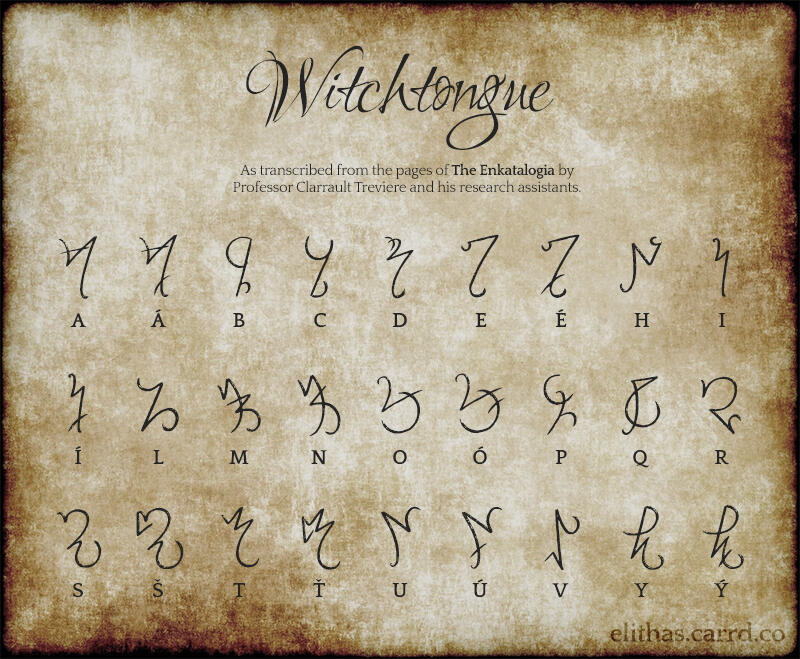
(I created this font out of sheer, unhinged self-indulgence. You can download it here if you so desire.)
It should be noted that this written alphabet is missing the following letters commonly found in modern Eorzean: 'F', 'G', 'J', 'K', 'W', and 'Z'. The reasoning for this appears to be simplification, as the phonetic sounds made by these letters are replicated using others, reducing the number of symbols to be memorized.

♦ Grammatical Rules ♦
♦ The language of witches is not gendered. However, it does have singular, plural, and other forms.♦ Double letters (i.e. "tt", "mm", "ll", etc.) are always reduced to single letters.♦ "C" is always given a hard pronunciation. ("kuh" as opposed to "suh")♦ Inflections lean towards suffixes.

♦ CASES
Nouns in Witchtongue are marked by function using transformative suffixes.
| Case | Suffix | Example | Translation |
|---|---|---|---|
| Subject/Nominative | -sin | tamsin | the end |
| Object/Accusative | -or | tamor | (something affects) the end |
| Vocative | -los | tamlos | O, end! |
| Possessive/Genitive | -ra | tamra | the end's |
| Indirect Object/Dative | -aq | tamaq | (done, sold, etc.) to the end |
| Ablative | -as | tamas | (is done) by the end |

♦ PLURALIZATION
Subjects are modified into plural forms by the addition of determiners, which are placed after the word.
| Numeral Form | Determiner | Example | Translation |
|---|---|---|---|
| Singular (one) | -is | sylvis | one crow |
| Dual/Vestigial (two) | -sa | sylvsa | two crows |
| Plural (three or more) | -sos | sylvsos | many crows |

♦ PRONOUNS
Witchtongue has singular and plural pronouns. As previously stated, the langauge and culture of witchcraft is not gendered, therefore pronouns within spellcasting do not distinguish gender.
| Number Form | Pronoun | Translation |
|---|---|---|
| 1st (Singular) | ata | I, me |
| 1st (Plural) | moc | we, us |
| 2nd (Singular) | etu | you |
| 2nd (Plural) | von | you (pl.) |
| 3rd (Singular) | som | he, her, they |
| 3rd (Plural) | dos | they, them |

♦ POSSESSIVE DETERMINERS
Witchtongue uses possessive determiners to indicate possession, as well as emphatic suffixes to lend contrastive power.
| Form | Determiner | Suffix | Example | Translation |
|---|---|---|---|---|
| 1st (Singular) | a' | {noun}-ta | a'nelalta | my mother |
| 1st (Plural) | m' | {noun}-oc | m'nelaloc | our mother |
| 2nd (Singular) | e' | {noun}-tu | e'nelaltu | your mother |
| 2nd (Plural) | v' | {noun}-oq | v'nelalon | your mother |
| 3rd (Singular) | s' | {noun}-om | s'nelalom | his/her/their mother |
| 3rd (Plural) | d' | {noun}-os | d'nelalos | their mother |

♦ ARTICLES
As spells require specification in order to achieve the exact result desired, Witchtongue does not use indefinite articles, instead relying on definite articles to designate nouns.
| Form | Article | Example | Translation |
|---|---|---|---|
| Specific | l'ha | l'ha retoc | the stone |
| Specific (Plural) | l'har | l'har retoc | the stones |
| Generic | lo | lo noq | a rat |
| Generic (Plural) | lor | lor noq | rats |
| Abstract | sol | sol redala | pain |

♦ VERB TENSES & CONJUGATION
Witchtongue has four tenses: present, past, imperfect, and future.To denote the inflection of a verb, subject pronouns are omitted in place of conjugated suffixes to specify both tense and subject pronoun.
♦ Present ⸻ Denotes events that happen in the present time. Present tense formation differs for the 1st and 2nd-3rd persons. The 1st person present (both singular and plural) is conjugated by adding a specific personal ending to the stem. In contrast, the 2nd and 3rd person presents (sg. and pl.) are formed by attaching the tense marker -nis to the stem, followed by a separate pronoun to indicate person and number.
| Tense | Marker | Example | Translation |
|---|---|---|---|
| 1st (Singular) | -an | silan | I run |
| 1st (Plural) | -in | silin | we run |
| 2nd (Singular) | -nis + tu | silnis tu | you (s.) run |
| 2nd (Plural) | -nis + on | silnis on | you (pl.) run |
| 3rd (Singular) | -nis + om | silnis om | he/she runs |
| 3rd (Plural/Nonbinary) | -nis + os | silnis os | they run |
♦ Past ⸻ Events which happened in the past and have concluded. Past tense is made by adding the specific suffix -ciq to the stem. Person and number are indicated by a separate subject pronoun following the verb, except for the 1st person (sg. and pl.), which has a unique suffix marker added to the stem.
| Tense | Marker | Example | Translation |
|---|---|---|---|
| 1st (Singular) | -am | silam | I ran |
| 1st (Plural) | -id | silid | we ran |
| 2nd (Singular) | -ciq + tu | silciq tu | you (s.) ran |
| 2nd (Plural) | -ciq + on | silciq on | you (pl.) ran |
| 3rd (Singular) | -ciq + om | silciq om | he/she ran |
| 3rd (Plural/Nonbinary) | -ciq + os | silciq os | they ran |
♦ Imperfect ⸻ Events which began in the past but have yet to conclude, or events that are reoccurring. Similarly to past tense, imperfect tense is made by adding the specific suffix -moc to the stem. Person and number are once again indicated by a separate subject pronoun following the verb, with the exception of 1st person (sg. and pl.), which is given a unique suffix.
| Tense | Marker | Example | Translation |
|---|---|---|---|
| 1st (Singular) | -ar | silar | I am running |
| 1st (Plural) | -im | silim | we are running |
| 2nd (Singular) | -moc + tu | silmoc tu | you (s.) are running |
| 2nd (Plural) | -moc + on | silmoc on | you (pl.) are running |
| 3rd (Singular) | -moc + om | silmoc om | he/she is running |
| 3rd (Plural/Nonbinary) | -moc + os | silmoc os | they are running |
♦ Future ⸻ Events which have yet to occur. The tense marker -hod is added to the stem if the event is certain to happen, but if the likelihood of the event is unknown, the marker -cal is used instead. , As with other tenses, person and number are indicated by a separate pronoun, and for future tense, 1st person (sg. and pl.) is also treated in the same manner.
| Tense | Marker | Example | Translation |
|---|---|---|---|
| 1st (Singular) (Certain) | -hod + ta | silhod ta | I will run |
| 1st (Plural) (Certain) | -hod + oc | silhod oc | we will run |
| 2nd (Singular) (Certain) | -hod + tu | silhod tu | you (s.) will run |
| 2nd (Plural) (Certain) | -hod + on | silhod on | you (pl.) will run |
| 3rd (Singular) (Certain) | -hod + om | silhod om | he/she will run |
| 3rd (Plural/NB) (Certain) | -hod + os | silhod os | they will run |
| 1st (Singular) (Uncertain) | -cal + ta | silcal ta | I may run |
| 1st (Plural) (Uncertain) | -cal + oc | silcal oc | we may run |
| 2nd (Singular) (Uncertain) | -cal + tu | silcal tu | you (s.) may run |
| 2nd (Plural) (Uncertain) | -cal + on | silcal on | you (pl.) may run |
| 3rd (Singular) (Uncertain) | -cal + om | silcal om | he/she may run |
| 3rd (Plural/NB) (Uncertain) | -silcal + os | silcal os | they may run |

♦ CONJUNCTIONS
Conjunctions are used sparingly in Witchtongue in order to keep spells simple, but they are required more often in complicated rituals to ensure clarity of intention.
| Preposition | Eorzean Eq. | Example | Translation |
|---|---|---|---|
| al | and | lo seloc al lo noq | a cat and a rat |
| cad | but | cad silhod tu | but you will run |
| alamon | for | alamon m'nelaloc | for our mother |
| mas | neither/nor | mas etu mas ata | neither you nor I |
| var | or | sol vole var sol péq | life or death |
| cos | so | cos silid | so we ran |
| lenam | yet | lenam talvovucal ta | yet we may live |

♦ PREPOSITIONS
Prepositions in Witchtongue govern either the dative, nominative, or genitive case. The accusative case has merged with other cases.
♦ Dative ⸻ Indicates indirect receivers of actions or objects that are being used.
| Preposition | Eorzean Eq. | Example | Translation |
|---|---|---|---|
| eot | at | eot a'leoťa | at my house |
| duq | in | duq l'ha suorasin | in the forest |
| eol | on | eol lo crothasin | on a path |
| loc | to | loc m'iensosoc | to our caves |
| raoc | with | raoc sol a'sinheqta | with my power |
♦ Nominative ⸻ Focused on the subject of the statement, explaining who or what is taking action.
| Preposition | Eorzean Eq. | Example | Translation |
|---|---|---|---|
| nel | as | nel emeornis om | as he breathes |
| aedel | between | aedel l'har nailsos | between the branches |
| phe | from | phe sol suln | from harm |
| tiq | until | tiq praophmoc os | until they are bleeding |
| til | without | til sol paepha | without life |
♦ Genitive ⸻ Focused on a subject to indicate possession of another noun.
| Preposition | Eorzean Eq. | Example | Translation |
|---|---|---|---|
| leceom | across | leceaom l'ha siemsin | across the sea |
| loqaer | around | loqaer e'ctúlnantu | around your throat |
| lá | during | lá l'ha inplesin | during the night |
| aks | of | aks a'pume-ta | of my belongings |
| qim | towards | qim sol péq | towards death |
| lod | through | lod s'ladaqom | through his heart |

♦ PREPOSITION CONJUGATIONS
For the sake of simplifying incantations and increasing the speed by which spells may be invoked, prepositions are often conjugated to reduce the number of syllables necessary for a cast.
♦ Inflected Prepositions with Personal Pronouns
| Preposition | ata (me) | etu (you s.) | som (them s.) | moc (us) | von (you p.) | dos (them p.) |
|---|---|---|---|---|---|---|
| eot (at) | eota | eotu | eos | eoc | eon | etos |
| duq (in) | dut | det | dus | dum | duvo | doq |
| eol (on) | elta | eoltu | els | elm | elvon | eldos |
| loc (to, for) | locta | letu | losom | lomoc | lovon | lodos |
| raoc (with) | rata | retu | rasom | ramoc | ravon | rados |
♦ Inflected Prepositions with Possessive Determiners
| Preposition | a' -ta (my) | e' -tu (your s.) | s' -om (their s.) | m' -oc (our) | v' -oq (your p.) | d' -os (their p.) |
|---|---|---|---|---|---|---|
| eot (at) | aota | etu | seom | meoc | veoq | detos |
| duq (in) | aduta | edutu | suqom | muqoc | vuqoq | duqos |
| eol (on) | ælta | eltu | solom | meloc | veloq | dolos |
| loc (to) | alota | elotu | soloc | moloc | voloq | docos |
| raoc (with) | araota | eratu | saocom | maococ | vaocoq | daocos |

♦ POINTERS
A class of nouns that are used to indicate which objects a spell is referring to; the following "pointers" are using in conjunction with a noun.
| Word | Eorzean Eq. | Example | Translation |
|---|---|---|---|
| cau | this | cau remas | this blade |
| qiud | that | qiud phaoraor | that cat |
| hos | here | hos caecenhin | here we stand |
| oto | there | oto péceoqhod os | there they will die |

♦ QUESTION WORDS
A class of interrogative trustee nouns. This words may also be used to form descriptive phrases.
| Word | Eorzean Eq. | Example | Translation |
|---|---|---|---|
| unc | who | unc liolaenhod om | who will fall |
| cieroc | what | cieroc tréoťmoc os | what plagues them |
| ciemdu | when | ciemdu l'ha gealachsin áoloqhod | when the moon rises |
| ipo | where | ipo litehciq om | where she was born |
| cien | how | cien seomacal om | how he may cry |
| ciela | why | ciela nelthin | why we kill |

♦ QUANTITY WORDS
A final class of trustee nouns that exists to emphasize the quantity of persons and/or objects involved in the spell.
| Word | Eorzean Eq. | Example | Translation |
|---|---|---|---|
| manu | no one | manu phouqod | no one will know |
| cioc | someone | cioc sriomcal | someone may hear |
| unmoc | everyone | unmoc phiremhod | everyone will suffer |
| mohor | nothing | mohor clodhod ata | nothing will stop me |
| ciocten | something | ciocten elhelnis om | something changes him |
| unmoe | everything | unmoe elhelhod | everything will change |
| miqien | nowhere | miqien rulťod tu sol cólh | nowhere will you find peace |
| eroqu | somewhere | eroqu leqeomhod oc | somewhere we will wander |
| povoc | everywhere | povoc sriomnis om coelesos | everywhere she hears whispers |

♦ NUMBERS
Specific counting is rarely necessary in spellcraft, but should it be required, it most often does not surpass the third numeral.
| Word | Eorzean Eq. |
|---|---|
| is | one |
| isa | two |
| isos | three |

Through careful study of The Enkatalogia and the language of Witchtongue, scholars were able to derive the following spells, incantations, and rituals from the grimoire's pages. It is not known how common these spells are; whether or not any are still in use; or if they were inventions of this witch in particular. Given how thoroughly this grimoire had been populated with knowledge, however, it is believed that its owner spent several decades practicing the craft and recording everything they learned with a high attention to detail. As such, it is accepted that the spells contained within its pages were an accurate catalogue of witchery magicks during this witch's time.Please note: Unless one is a witch themselves; a senior scholar of Sharlayan involved in the advanced studies of cryptic and theoretical magicks; or otherwise has access to the forbidden sections of Noumenon, it is tremendously unlikely that one would know any of the following information.
♦ Spell Structure ♦
Extensive studying of The Enkatalogia led scholars to the conclusion that the structure of phrases used to invoke a witch's magick will vary depending on the type of intended outcome. For example, a simplistic spell may require no more than a single word, while an extensive ritual may require an incantation to be endlessly repeated until it successfully concludes.
♦ MINOR SPELLS & CHARMS
Verb* ⇢ Subject
i.e. "Change to stone this rat."
* Depending on the simplicity of the spell, a singular verbal command may be all that is necessary to produce the desired effect.
♦ INCANTATIONS
Singular Verb (x2) ⇢ Verb ⇢ Subject ⇢
Subordinating Conjunction ⇢ Conditionary Statement in VSO
i.e. "Arise, Arise! Arise from earth this corpse when sets the sun."
♦ RITUALS
Inciting Chant
⇣
First Will: Verb ⇢ Subject
⇣
Second Will: Verb ⇢ Subject
⇣
Counteraction: Subordinating Conjunction ⇢ Conditional (VSO)
⇣
Third Will: Verb ⇢ Subject
⇣
Offering: Verb ⇢ Subject ⇢ Object
⇣
(Repeat First Will through Offering as necessary.)
⇣
Concluding Chant
i.e. "[Inciting Chant] + Render his flesh, shatter his bones.
When rises the full moon, hear only his moans.
Offer we his blood to you alone. + [Concluding Chant]"


♦ Minor Spells & Charms ♦
♦ SUMMONING CHARM
A simple charm, used to summon objects from a distance. An advanced variation of this charm may be used to summon individuals. It is unclear through which plane the subject in question travels during the summoning, even if briefly.
"Venire loc ata."
(Translation: Come to me.)
♦ SEVERING CHARM
Whether it be fabric, chain, shackles, or material of an organic nature, this charm is apt to release one from such bindings — quite a necessary spell for any witch to ensure they are never caught without the ability to cast.
"Somdu cau erotelile."
(Translation: Sever this binding.)
♦ Curses & Hexes ♦
♦ A MANIFESTATION OF SPIDERS
Think of many small, insectile legs, skittering across one's tongue and spilling forth from one's throat without abandon. It's truly unpleasant to picture in one's imagination, isn't it? Now consider it actually happening to you.
"Vamou, vamou! Phe omvocus laresos vocan,
Qud latlunis om duq serotusin,
Phriu phe ontilic rilesos,
Al etelau s'nevuralom."
(Translation: Forth, forth! From unseen webs I call
That which scuttles in the dark
To pour from vile mouths
And manifest thine ill will.)
♦ Incantations & Enchantments ♦
Translations are still in process. It is believed this branch of spellcasting is applicable to styles of magick such as transmogrification.
♦ Rituals ♦
♦ COVEN BINDING CEREMONY
A powerful ritual that is used to bind the magicks of a witch to that of a specific coven, as well as the High Priestess of that coven. In doing so, their individual power is suppressed. Some covens will modify the ceremony to end with a question of consent, but there are many that do not require the subject of the ceremony to acquiesce to the binding.
"Aranamlas Phirnamsin, Otmocsin, Lallesin, Tresoacsin, Eqiesin, al Vamlicsin,
Edrotin loc l'ha suvam aks [HIGH PRIESTESS] cau volš.
Tulatu m'cululsosoc al m'velalsosoc, telouhod tu e'netostu ramoc.
Duq l'ha phesoan aks sol nerin, duq l'ha phesoan aks lor omonos,
duq l'ha phesoan aks sol lonul, telouhod tu e'netostu raoc s'suvamom.
Sadi e'tulaclectu lomoc nel is.
Varsunid etu, [NAME]."
(Translation: By the elements of Lightning, Fire, Earth, Ice, Water, and Wind,
We bind to the coven of [HIGH PRIESTESS] this witch.
To protect our sisters and brothers, you will share your magick with us.
In the face of evil, in the face of foes, in the face of fear, you shall share your magick with her coven.
Surrender your strength to us as one.
We welcome you, [NAME].)
♦ THE BLOOD-LETTING RITUAL
Study of this ritual is still in process.
"Spell to be determined."
(Translation: To Be Determined)






























































